 04/10/2009 19:46 04/10/2009 19:46 |
|
| | | OFFLINE | | Post: 18.558
Post: 1.211 | Registrato il: 28/08/2005
Registrato il: 20/01/2009 | Administratore | Utente Veteran | |
|
 Earlier posts for 10/4/09 on the preceding page, including full text of the Pope's homily at the Mass today.
Earlier posts for 10/4/09 on the preceding page, including full text of the Pope's homily at the Mass today.
 ANGELUS TODAY
ANGELUS TODAY
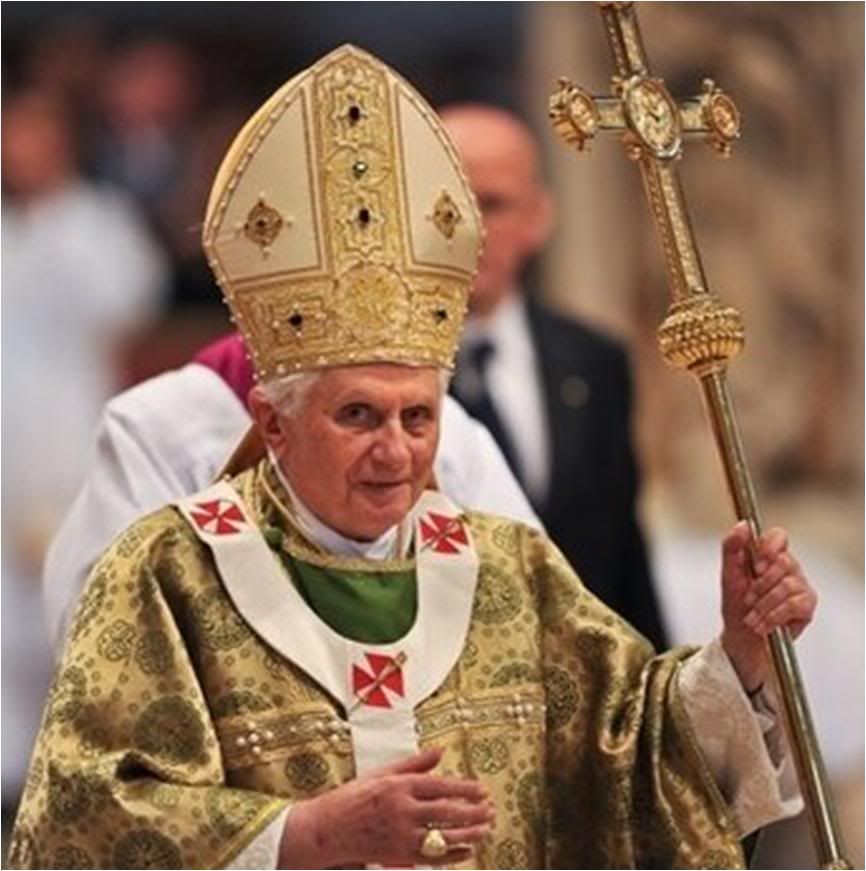 The Holy Father after the Mass this morning. No photos available so far of the Angelus.
The Holy Father after the Mass this morning. No photos available so far of the Angelus.
In his Angelus messages today, the Holy Father explained the coming Synodal assembly on Africa and asked the faithful to pray for its success and for the people of Africa.
He also asked prayers for the populations struck by various natural disasters recently in the South Pacific and Southeast Asia, as well as in the Messina area of Sicily.
Here is a translation of the Holy Father's words before and after the Angelus prayers:
Dear brothers and sisters:
This morning, at St. Peter's Basilica, we had the Eucharistic Celebration to mark the opening of the Second Special Assembly for Africa of the Bishops' Synod, during which prayers were offered in various African languages.
My venerated predecessor John Paul II called the first 'African Synod' in 1994, ilooking to the year 2000 and the third Christian millennium.
He, who with missionary zeal had been a pilgrim so many times to African lands, put together the results that emerged from that assembly into the Apostolic Exhortation Ecclesia in Africa, which re-launched evangelization on the continent.
From a distance of 15 years, this new assembly is in continuity with the first one - to check back on what has been accomplished since then, to look into some aspects in depth, and to examine more recent challenges.
The theme chosen for this assembly is "The Church in Africa in the service of reconciliation, justice and peace - 'You are the salt of the earth... the light of the world' (Mt 5,13-14)".
The Synod always constitutes an intense ecclesial experiencee, an experience of collegial pastoral responsibility with respect to a specific aspect in the life of the Church, or, as in this case, to a part of the Christian people based on geographical area.
The Pope and his closest co-workers get together with the designated members of the assembly, and with experts and auditors, in order to discuss the chosen subject.
It is important to underscore that this is not a study session, nor a programmatic assembly. Relations and interventions are heard together, we meet each other in groups, but all participatns know full well that the protagonists are not we ourselves - rather it is the Lord, his Holy Spirit, who leads the Church.
The most important thing, for everyone, is to listen - to listen to each other, while all of us listen to what the Lord wishes to tell us. That is why the Synod assembly takes place in an atmosphere of faith and prayer, in religious obedience to the Word of God.
It falls on the Successor of Peter to convoke and to guide the synodal assemblies, to put together what comes out of the work done, in order to eventually offer the appropriate pastoral directives.
Dear friends, Africa is a continent with extraordinary human riches. Today, her population comes to almost a billion people and her overall brith rate is higher than the global rate.
Africa is a land fertile with human life, but this life is unfortunately marked by so much poverty and still suffers from onerous injustices.
The Church is committed to overcome these problems with the power of the Gospel and the concrete solidarity of so many charitable institutions and initiatives.
Let us pray to the Virgin Mary that she may bless the Second Special Assembly for Africa and obtain peace and development for that great and beloved continent.
After the Angelus prayers, the Holy Father had the following special emssages:
At this moment, my thoughts go to the peoples of the Pacific and Southeast Asia who have been struck in recent days by violent natural calamities: the tsunami in the Samoa and Tonga islands; the typhoon in the Philippines which went on to hit Vietnam, Laos and Cambodia; a devastating earthquake in Indonesia.
These catastrophes have caused grave losses in human lives, numerous displaced and homeless persons, and crippling material damages.
I also think of all those who suffer because of the flooding in Sicily, especially in the area of Messina.
I ask all of you to join me in prayer for the victims and their loved ones. I am spiritually close to all the displaced persons and those who have been severely tested, imploring God to relieve them in their suffering.
I make an appeal so that these brothers and sisters may not lack for our solidarity and the support of the international community.
At the end of the Angelus prayer on this Sunday, having opened the Second Special Assembly for Africa of the Bishops' Synod, I cannot forget the present conflicts which place at risk the peace and safety of the peoples of Africa.
These days, I have followed with apprehension the serious episodes of violemce which have shaken the people of Guinea. I express my condolences to the families of the victims, I call on the opposing sides to dialog and reconciliation, certain that they will not spare their efforts to reach an equitable and just solution.
Next Saturday afternoon, October 10, together with the Synodal fathers, I will lead a special recitation of the Holy Rosary at Aula Paolo VI - "with Africa and for Africa" - inspired by the university of students of Rome. Students from some African countries will join us through satellite linkage.
Dear university students, I hope you will participate in great numbers, as we entrust to Mary Seat of Wisdom the way of the Church and society on the African continent.
In English, he said:
I offer a warm welcome to the English-speaking visitors gathered for this Angelus prayer.
I invite all of you to join me in praying for the Second Special Assembly of the Synod of Bishops for Africa, which opened this morning in Saint Peter’s Basilica.
May this great ecclesial event strengthen the Church in Africa in her witness to the Gospel of Jesus Christ and in her efforts to promote reconciliation, justice and peace among its peoples.
May the Synod also help turn the eyes of the world to that great continent and inspire renewed solidarity with our African brothers and sisters.
As we entrust these prayers to the intercession of Our Lady, I invoke upon you and your families God’s blessings of joy and peace!
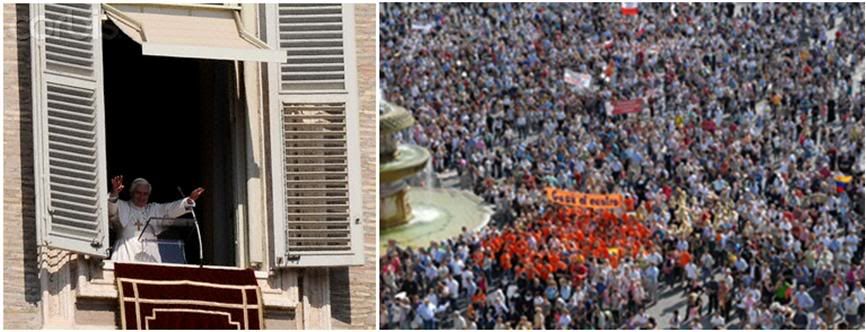 P.S. I finally found these pictures of this particular Angelus.
P.S. I finally found these pictures of this particular Angelus.
[Modificato da TERESA BENEDETTA 08/10/2009 23:24] |
| |
|
| |
 04/10/2009 22:52 04/10/2009 22:52 |
|
| | | OFFLINE | | Post: 18.559
Post: 1.212 | Registrato il: 28/08/2005
Registrato il: 20/01/2009 | Administratore | Utente Veteran | |
|
|
| |
 05/10/2009 14:26 05/10/2009 14:26 |
|
| | | OFFLINE | | Post: 18.560
Post: 1.213 | Registrato il: 28/08/2005
Registrato il: 20/01/2009 | Administratore | Utente Veteran | |
|

 Monday, Oct. 5
Monday, Oct. 5
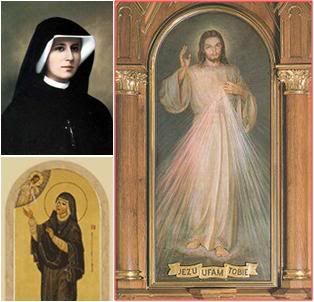 ST. MARY FAUSTINA KOWALSKA(Poland, 1905-1938)
ST. MARY FAUSTINA KOWALSKA(Poland, 1905-1938)
Nun and Visionary, canonized 2002
Originated popular devotion to Divine Mercy.
John XXIII banned her writings but John Paul II
re-investigated the case and eventually canonized her.
No OR today.
THE POPE'S DAY
The Holy Father opened the working sessions of the Bishops Synod's Second Special Assembly for Africa.
Extemporaneous address in Italian.
[Modificato da TERESA BENEDETTA 05/10/2009 14:30] |
| |
 05/10/2009 15:48 05/10/2009 15:48 |
|
| | | OFFLINE | | Post: 18.561
Post: 1.214 | Registrato il: 28/08/2005
Registrato il: 20/01/2009 | Administratore | Utente Veteran | |
|

 Unfortunately, the Bishops Synod daily bulletin has posted today's bulletin in all the other languages except English! Here first is what the bulletin says about the first working session.
Working sessions open
Translated from
Unfortunately, the Bishops Synod daily bulletin has posted today's bulletin in all the other languages except English! Here first is what the bulletin says about the first working session.
Working sessions open
Translated from

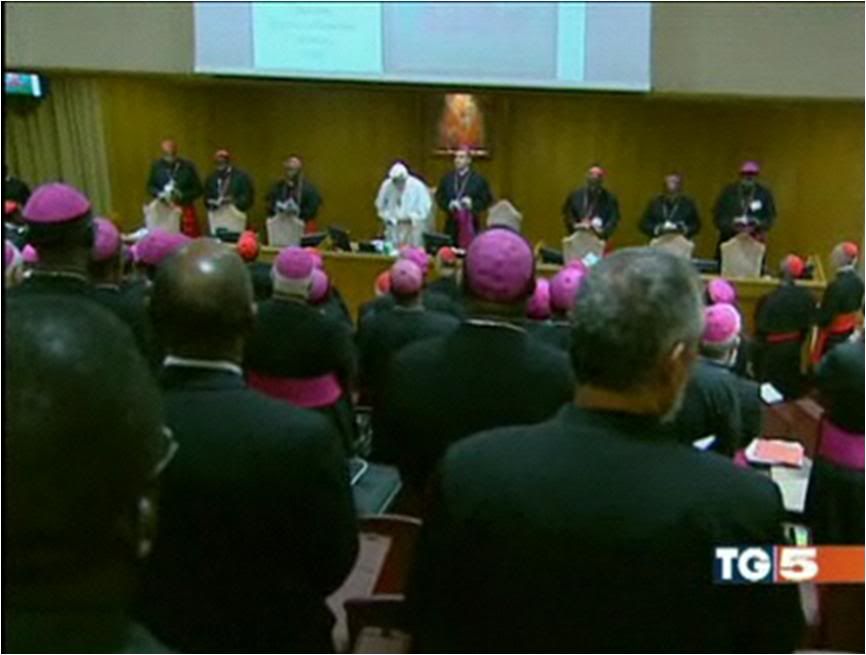
This morning, Monday, Oct. 5, at 9:00 a.m., the working sessions of teh Second Special Assembly for Africa of the Bishops' Synod started in the presence of the Holy Father at the Synod Hall of the Vatican.
The first general congregation of the assembly opened with the hymn Veni Creator Spiritus and the chanting of Terce from the Liturgy of the Hours.
The Holy Father then delivered a reflection.
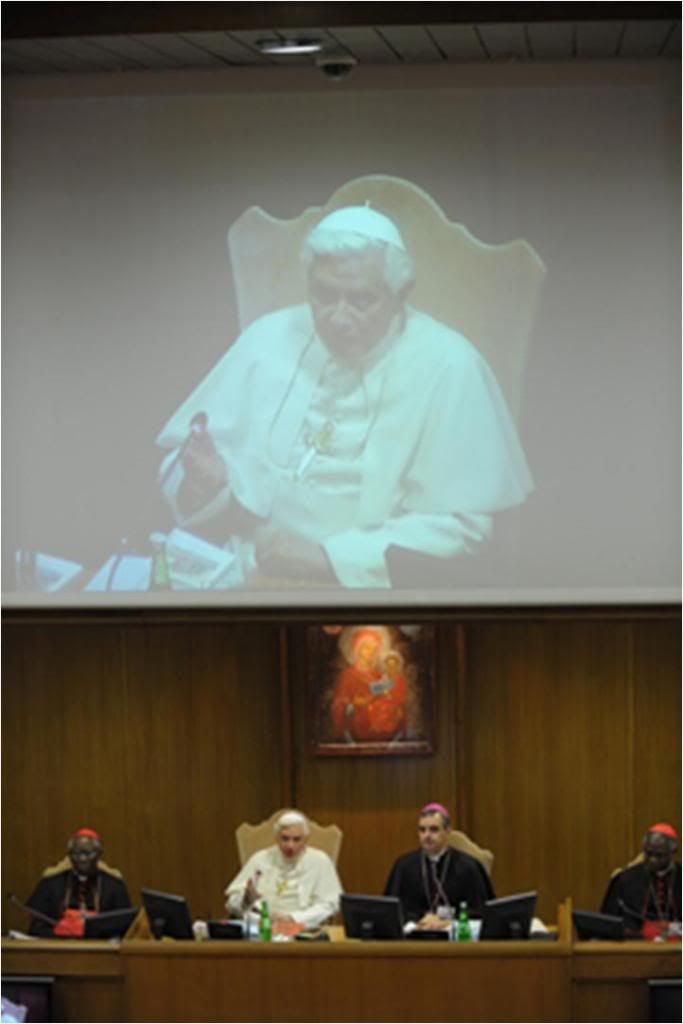
Speaking of the action of the Holy Spirit, the Pope said that it is only thanks to his power that the Church can continue its work, and invoking him, he prayed that Pentecost does not remain an event in the past but that it may be re-created here and now.
He said the Church is not an organization but the fruit of the Spirit, directed towards the City of God under which all cultures are together.
It is precisely 'tongues of fire' that give the right words, he said, so that the Church may achieve true unity in plurality, collaborating in God's creative work.
He specified three words for reflection: confessio, caritas and prossumus. 'Confessio' is renewal and transformation, so that with God's light, reality can be seen, we can know ourselves and understand the realities of the world, and therefore be able to bear witness and to evangelize.
About 'caritas', the Pope reiterated that Christianity is not a collection of ideas nor a philosophy, and that one becomes Christian because of love. Citing the Gospel passage about the good Samaritan, the Pope said charity is universal and concrete.
And universality starts from love for one's neighbor, the 'prossumus'. The love that comes from the Holy Spirit, he said, calls us to active responsibility for our neighbor, which then becomes universality in service to the world.
Presiding at the first congregation was Cardinal Francis Arinze, emeritus prefect of the Congregation for Divine Worship, one of three presidents-delegate named by the Pope.
He delivered a brief greeting to the participants, followed by a report from Mons. Nicola Eterovic, Secretary-General of the Bishops' Synod.
After the mid-morning break, the general moderator, Cardinal Peter Kodwo Appiah Turkson, Archbishop of Cape Coast (Ghana), delivered introductory remarks.
This was followed by an open discussion.
The First General Congregation concluded at 12.25 with the Prayer of the Angelus Domini led by the Holy Father.
There were 226 Synodal Fathers present.
The Second General Congregation takes place this afternoon at 4.30 p.m. for the Reports on the five Continents.
Here is a translation of the reflection offered by the Holy Father at the first General Congregation:
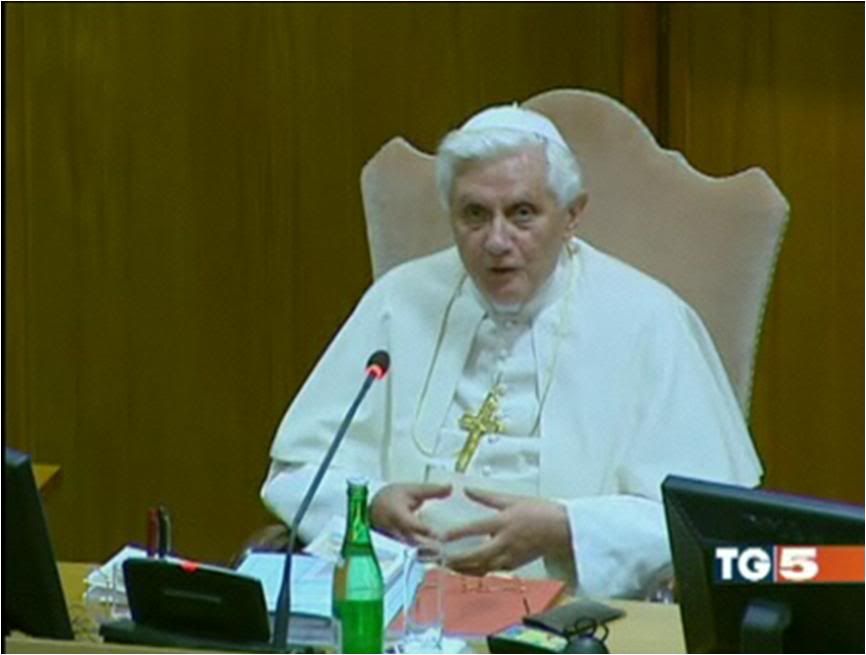
Dear brothers and sisters,
We have now begun our synodal encounter, calling on the Holy Spirit, knowing full well that at this time we cannot achieve what must be done for the Church and for the world: only with the power of the Holy Spirit can we find that which is right and accomplish it.
And every day we will begin our work by calling on the Holy Spirit with the Prayer of the Hour of Terce [ 9:00 Morning Prayer in the Liturgy of the Hours, the third Prayer of the day] , “Nunc sancte nobis Spiritus”.
Therefore I would like to meditate briefly now, together with you all, on this hymn, which opens the work of every day, now during the Synod, as well as in our daily life.
“Nunc sancte nobis Spiritus”. We pray that the Pentecost may not only be an event of the past - the beginnings of the Church - but that it may also be today, now.
“Nunc sancte nobis Spiritus”. Let us pray that the Lord accomplish the effusion of His Spirit now and re-create anew his Church and the world. We recall that the apostles after the Ascension did not begin - as would have been usual - to organize, to create the Church of the future.
They waited for God’s action, they waited for the Holy Spirit. They understood that the Church cannot be 'made', that it is not the product of our organization: the Church must be born of the Holy Spirit. Just as the Lord himself was conceived and born of the Holy Spirit, the Church must also be conceived and born of the Holy Spirit.
Only through this creative act of God can we enter the activity of God, into divine action, and collaborate with Him. In this sense, even all of our work at the Synod is a collaboration with the Holy Spirit, with the power of God that precedes us.
And we must always continue to implore the fulfillment of this divine initiative, in which we can become collaborators of God and contribute so that his Church may be reborn anew and grow.
The second verse of this hymn - “Os, lingua, mens, sensus, vigor, / Confessionem personent; / Flammescat igne caritas, / accendat ardor proximos” - is the heart of this prayer. [Let flesh, and heart, and lips, and mind,/ sound forth our witness to mankind;/ and love light up our mortal frame,/ till others catch the living flame.]
We beg God for three gifts, the essential gifts of Pentecost, the gifts of the Holy Spirit: confessio, caritas, proximos.
Confessio: the tongue of fire that is “reasonable”, it gives us the correct words and makes one think about overcoming Babel on the day of Pentecost. The confusion born from man's selfishness and pride, the effect being the inability to understand each other, must be overcome by the force of the Spirit, which unites without making everyone uniform, which gives unity in plurality: each can understand the other, even in the diversity of their languages.
Confessio: the word, the tongue of fire that the Lord gives us, the common word which unites us all - the City of God, the Holy Church - in which all the wealth of our different cultures is present.
Flammescat igne caritas. [That love may light us up...] This confession is not a theory but life, love. The heart of the Holy Church is love, God is love and communicates Himself to us by communicating love.
And finally, the proximos (neighbor). The Church is never a group closed in on itself, which lives for itself like so many of the groups existing in the world. Rather she is distinguished by her universal charity, her responsibility for the neighbor.
Let us consider these three gifts one by one.
Confessio: in the language of the Bible and the early Church, this word had two essential meanings, which might seem opposed but in fact, constitute one reality.
Confessio, first of all, is the confession of sins: to recognize our faults and to know that before God we are wanting, we are at fault, we are not in the right relationship with Him.
This is the first point: to know ourselves in the light of God. Only in his light can we know ourselves, can we also understand what evil tehre is in us, and thus see how much must be renewed, transformed. Only in the light of God can we know each other and truly see all of reality.
I feel that we must keep in mind all this in our analysis of reconciliation, justice, peace. Empirical analyses are important - it is important to know exactly the reality of this world. However these horizontal analyses, though made with exactitude and competence, are insufficient. They do not indicate the real problems because they are not seen in the light of God.
If we cannot see that at the root of everything lies the Mystery of God, then the matters of the world do not go well, because the relationship with God is not in order. And if the first relationship, the fundamental one, is not correct, all other relationships, no matter how good they may be,will basically not work.
Therefore all our analyses of the world are inadequate if we do not look deeper, if we do not get to the point where we consider the world in the light of God, if we do not discover that at the root of injustice, of corruption, there is a heart that is not upright, that is closed to God, and, therefore, a falsification of the essential relationship which is the foundation of all others.
Confessio: to understand the realities of the world in the light of God, the primacy of God, and finally, human existence itself and human realities, which must be oriented towards our relation with God. And if this is not right, if it does not reach the point that God wants, does not enter His truth, then all the rest cannot be corrected, because all the evils will re-emerge to destroy the social network and peace in the world.
Confessio: to see reality in the light of God, to understand that ultimately our realities depend on our relationship with our Creator and Redeemer, and thus lead to truth, the truth that saves.
Saint Augustine, referring to Chapter 3 of the Gospel of Saint John, defines the act of Christian confession as “to make truth, to go towards the light”. Only by seeing our faults in the light of God, the insufficiencies in our relationship with Him, can we walk in the light of truth. And only truth will save.
Finally, we work in truth: to really confess in the depth of God’s light is to make truth. This is the first meaning of the word confessio - confession of sins, recognizing the guilt that results from a lack of relationship with God.
However a second meaning of confessio is to thank God, to glorify God, to bear witness to God. We can recognize the truth of our being because there is a divine answer. God has not left us alone with our sins: even when our relationship to his majesty is blocked, He does not turn away, but comes to us and takes us by the hand.
Therefore confessio is a testimony to God’s goodness, it is evangelization. We could say that the second dimension of the word confessio is identical to evangelization.
We can see this on the day of Pentecost, when Saint Peter, in his speech, on one hand names the sin that has been committed - you killed Him who is holy and just - but, at the same time, he says: this Holy One has risen and loves you, embraces you, calls upon you to be His in contrition and baptism, as well as in communion with His Body.
In the light of God, to confess necessarily becomes proclaiming God, to evangelize and thus renew the world.
The word confessio however reminds us of another element. In Chapter 10 of the Letter to the Romans, Saint Paul interprets the confession in Chapter 30 of Deuteronomy. In this text, it would seem that the Jews, entering the definitive form of the covenant, in the Holy Land, were fearful and could not really respond to God as they should have done.
The Lord tells them: do not be afraid, God is not far. To reach God it is not necessary to cross an unknown ocean, there is no need for space travel in the heavens, for complicated and impossible things.
God is not far, He is not on the other side of the ocean, in the immense spaces of the universe. God is close. He is in your heart and on your lips, with the word of the Torah, which goes into your heart and is proclaimed from your lips. God is in you and with you, He is near.
Saint Paul substitutes, in his interpretation, the word Torah with the words confession and faith. He says: truly God is close, there is no need for complicated expeditions to reach Him, nor for spiritual or material adventures. God is close - with faith, He is in your heart, and with confession, He is on your lips. He is in you and with you.
Truly, Jesus Christ with His presence gives us the word of life. Thus He enters, in faith, into our heart. He lives in our heart, and in confession, we bring the reality of the Lord to the world in our time.
I think this is a very important element: God is close. Things of science, of technology, require great investments: spiritual and material ventures are costly and difficult. But God gives Himself freely. The greatest things in life - God, love, truth - are free. God gives Himself to our hearts.
Indeed, we should often meditate on the free and generous giving of God: there is no need for great material or even intellectual gifts to be close to God. God gives Himself freely in His love: He is in me, in my heart and on my lips.
This is the courage, the joy of our life. It is also the courage present in this Synod, because God is not far: He is with us with the word of faith.
I think that even this duality is important: the word in the heart and on the lips. This depth of personal faith, which truly ties me intimately to God, must then be confessed: faith and confession, interiority in communion with God, and the testimony of faith that is expressed on my lips, athat thus becomes sensed and present in the world. These two important things always go hand in hand.
The hymn we are talking about even indicates the places where confession can be found: “os, lingua, mens, sensus, vigor”. All our abilities of thinking, speaking, hearing, acting, must resound with - the Latin uses the word “per-sonare” [resound through] - the word of God.
Our being, in all its dimensions, should be filled with this word, thus sensitizing the world, and through our existence, echoes in the world: the word of the Holy Spirit.
Then briefly, the two other gifts. Charity: it is important that Christianity is not a collection of ideas, a philosophy, a theology, but a way of life.
Christianity is charity, it is love. Only thus can we become Christians: if faith turns into charity, if it is charity. We could also say that logos and caritas go together. Our God is, on the one hand, logos, eternal reason. But this reason is also love. It is not cold mathematics that creates the universe, it is not a demiurge.
This eternal reason is fire, it is charity. This unity of reason and charity, of faith and charity, should be realized within us, and thus, transformed in charity, we become, as the Greek Fathers would say, 'divinized'.
I would say that in the development of the world, we have been making this ascent, from the first created realities to the human creature. But this ascent is not done. Man must be divinized to fulfill himself.
The unity of the creature and the Creator: this is true development, to arrive to this openness with the grace of God. Our essence is transformed to charity. If we speak of development, we must always think of this last goal, which God wants us to reach with him.
Finally, the neighbor. Charity is not an individual thing, but a universal and concrete thing. Today in the Mass, we proclaimed the Gospel page on the Good Samaritan, where we can see the dual reality of Christian charity, as universal and concrete.
This Good Samaritan meets a Jew, who is therefore outside the boundaries of his tribe and his religion. But charity is universal, and therefore he considers this stranger as his neighbor in all senses.
Universality opens the limitations that close the world and create differences and conflicts. At the same time, the fact that something must be done universally is not a philosophy but a concrete act.
We must proceed towards this unification of universality and concreteness - we must truly open the boundaries between tribes, ethnic groups, and religions to the universality of God's love. Not just in theory, but in the places of our life, with all the necessary concreteness.
Let us pray to the Lord to give us all this, in the power of the Holy Spirit. Ultimately, the hymn is a glorification of the Triune and One God, a prayer of knowing and believing. Thus the end returns to the beginning.
We pray that we may learn, that learning becomes believing, and believing becomes loving, action. We pray the Lord that He may give us the gift of the Holy Spirit, that he may inspire a new Pentecost, and help us to be His servants at this time in the world. Amen.
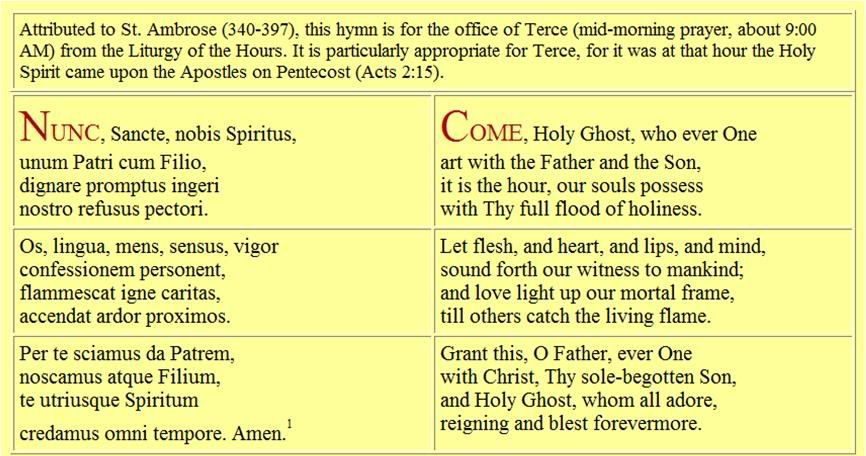
[Modificato da TERESA BENEDETTA 07/10/2009 07:38] |
| |
 06/10/2009 15:03 06/10/2009 15:03 |
|
| | | OFFLINE | | Post: 18.563
Post: 1.216 | Registrato il: 28/08/2005
Registrato il: 20/01/2009 | Administratore | Utente Veteran | |
|
 Tuesday, Oct. 6
Tuesday, Oct. 6
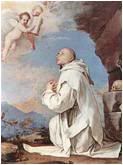 ST. BRUNO OF COLOGNE
ST. BRUNO OF COLOGNE
(b Germany c. 1030, d Italy 1101)
Confessor
Founder, Order of Carthusians
OR for 10/05-10/06:
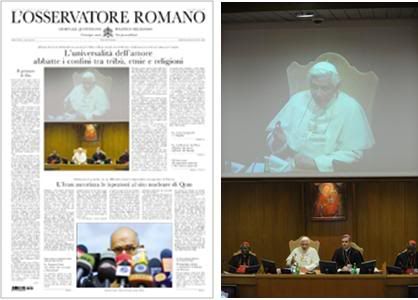
At the start of the working sessions of the Synodal assembly for Africa,
the Pope recalls that faith must be transformed to charity
in order to renew the world:
'The universality of love brings down barriers between tribes, races and religions'
This issue includes coverage of the Synodal assembly's opening Mass on Sunday, with the Holy Father's homily and Angelus messages; and of the first general congregation Monday morning, with the texts of the Holy Father's opening meditation, and the opening remarks and reports made by Cardinal Arinze, one of three preidents-delegate of the Assembly; the Secretary-General of the Bishops' Synod; and the general moderator of the assembly.
Page 1 international stories: Iran authorizes inspection of previously secret nuclear facility in Qom; North Korea says it is ready to resume multilateral talks on nuclear disarmament, but also wants one-on-one talks with the US; and terrorists target UN offices in Islamabad, capital of Pakistan.
THE POPE'S DAY
The Holy Father attended this morning's third general congregation of the synodal assembly on Africa,
and delivered a response in English to the intervention by the Patriarch of the Orthodox Church of Ethiopia.
[Modificato da TERESA BENEDETTA 07/10/2009 01:04] |
| |
 06/10/2009 16:07 06/10/2009 16:07 |
|
| | | OFFLINE | | Post: 18.566
Post: 1.219 | Registrato il: 28/08/2005
Registrato il: 20/01/2009 | Administratore | Utente Veteran | |
|



October 6, 2009
"Remember that the proclamation of the Gospel and adherence to the Christian values... is not merely useful but essential for building a good society....'"
— Benedict XVI to Brazilian Bishops, Ad Limina Visit of Brazilian Prelates from West Region, L'Osservatore Romano, (September 16, 2009. Citation from Caritats in veritate, #4.)
A good society ought to be possible to man's natural reason. We wonder why it is so rare that any even passable society comes about in human history.
The answer to this question has to do with our ability to locate and define what human life as such is about. It is not primarily about building a good society, though that is of importance.
Moreover, it would seem that even if we want a good society, something else is in fact necessary, something that is not necessarily or primarily political.
This position does not contradict Aristotle's notion that a good society is what the polis is for, that man is by nature a political animal which is not complete simply by itself.
"Proclamation of the Gospel and adherence to Christian values" are said by Benedict, speaking to some Brazilian bishops, to be more than "useful." They are "necessary."
Does this view undermine the relative autonomy or secularity of politics? The fact is that it makes this relative autonomy possible. All political societies are natural institutions whose end as such is also natural. Yet man is more than a "natural" being. He is created from his personal beginning to achieve the vision of God, something beyond his nature.
If we treat man as only natural, he will no doubt end up being less than natural. This is the record of human history. This consequence must mean there is more to ourselves than ourselves. This is what revelation is about.
The principle is not, get man's natural end right and you will be happy, but get man's supernatural end right or you will not be able to get his natural or this worldly end right.
Politics is not only the highest of the practical sciences, but it is also the main temptation of man. It is the most logical enthusiasm to replace God when we refuse his invitation to the end for which he is created.
The Holy Father's short address to the Brazilian bishops contains some remarkable lines.
"God," he tells them, "does not see as human beings see! The urgent need of the good Lord is dictated by his wish that 'all men be saved and to come to the knowledge of the truth'" (Tim. 2:4).
Thus, it would appear that God is not particularly concerned about the rise and fall of nations or the structures of polities except in so far as they foster or impede a purpose that is not itself political.
The pope describes our contemporaries, ourselves included. Many folks pass their "whole life in an instant and others wander in tedium and inertia or who abandon themselves to every sort of violence." He sees these lives as "desperate" for hope. They look for meaning in life.
The pope returns to the theme of what happened to the Church after Vatican II in order to alert bishops to the real issues.
"Some have interpreted openness to the world (after the Council) not as a requirement of the missionary zeal of the Heart of Christ, but rather as a passage to secularization, seeing in it several values of great Christian depth, such as equality, freedom and solidarity, and showing that they were ready to make concessions and to discover areas of co-operation." These thinkers, however, in analyzing such common ends did not always understand them in a Christian manner.
Thus, the pope is blunt here, "certain leading clerics"— no names given! — "took part in ethical debates in response to the expectations of public opinion." They talked about equality, freedom, and solidarity often enough but were silent on other matters in which the whole Christian mission to the world also consists.
"But [these same] people stopped speaking of certain fundamental truths of faith, such as sin, grace, theological life and the last things." And it was in these latter doctrines that the problems arose.
Spe Salvi had to write a complete reorientation of eschatology because those who only spoke of "equality, freedom, and solidarity" followed the ideologies into making these goals the principal purpose of man in the world.
Sin, grace, the theological virtues, and the four last things look beyond the future in this world. They intimate that the main purpose of man in the world is not the construction of some inner-worldly political order down the ages.
It is true that a correct understanding of these notions, all of them, might result in some adequate or good worldly society as an indirect effect of living well and knowing the transcendent end of each human person.
Such Catholic thinkers and "ecclesial communities" were caught up in what Benedict calls a "self-secularization." What was the result? They found their appeal to these limited interpretations was leaving the pews empty. People in great numbers began to leave the Church in which they were "deprived and disappointed" at not finding the essentials of Catholicism preached and deepened.
"When they meet us," Benedict writes in a happy phrase, "our contemporaries want to see what they see nowhere else, that is, the joy and hope that come from being with the Risen Lord."
It is the Risen Lord who grounds the particular destiny of each actual human being in history. It is not the movements of history or some future bliss down the ages.
When people look at the Church today, what do they see? "They see the abyss of differences and opposition to the Magisterium of the Church growing ever wider, especially in the field of ethics." We all know what this means, of course.
What is the result? "In this desert without God, the new generation feels a deep thirst for transcendence."
The pope, with his predecessor, meets a new youth who have not known unity in the public face of the Church. "It is the youth of this generation who knock at the doors of the seminary and need formation teachers who are real men of God."
These young men coming into seminaries, the Holy Father thinks, "participate in the Eucharist" daily. They love silence and prayer. What they seek, almost in the literal words of St. Ignatius of Loyola, is "the glory of God and the salvation of souls," including no doubt their own.
So, this short conference with a few Brazilian bishops (the photo in L'Osservatore Romano shows nine bishops), is rich in Benedict's analysis of what has gone wrong.
It is a penetrating mind at work of keeping the essentials before us. The Gospel does need to be proclaimed for what it is. Christian doctrines need to be lived. When they were not, it was not just the Church that was in trouble, but society itself, so intimately is the Gospel associated with how we live our lives.
If we never hear "sin, grace, the theological virtues, and the last things" preached and explained, we are missing what we need to hear. Paradoxically, only when we hear and live these things can we also find the "joy and hope that come from being with the Risen Lord..."
As usual, alone among all Anglophone observers of the Vatican and the papacy, only Fr. Schall takes the time and effort to scrutinize even Benedict XVI's 'routine' discourses - in this case, his address to visiting bishops of northeastern Brazil - for how the Holy Father always manages to re-state in fresh terms the essential truths of the faith and the priorities of pastoral activity today.
I found it very significant that he did so once again - extemporaneously and in a dense but clear exegesis of a hymn to the Holy Spirit - in his opening meditation for the Synodal assembly on Africa, instead of re-treading the ground he had tilled the previous day about the centrality of Africa in his homily at the opening Mass.

P.S. My oversight...because I had a rather late start today on my Forum tasks: the editor of OR did dedicate an editorial in today's (10/5-10/6) issue to the Pope's opening meditation. Here is a translation:
The primacy of God
Editorial
by Giovanni Maria Vian
Translated from
the 10/5-10/6/09 issue of

An invocation to the Holy Spirit began the work of the Second Special Assembly for Africa of the Bishops' Synod, opened at St. Peter's Basilica Sunday by a Eucharistic celebration in which Latin chant and African song were heard.
On both occasions, Benedict XVI spoke of the primacy of God, commenting on the Biblical readings for the Mass and reflecting on the hymn Nunc sancte nobis Spiritus, which tradition attributes to St. Ambrose.
The Pope went directly to the root of what is essential, underscoring the absolute importance of the divine design expressed in the creation of man - "In the image of God, he created man... he created man and woman" - and recalling how the coming of the Holy Spirit, descending on the Apostles at Pentecost, should not be just an event of the past but should be invoked always, as the hymn says 'nunc', now.
But today, that recognition of the lordship of God, which distinguishes African cultures, is at risk - Benedict XVI did not use half terms - to a colonialism that refuses to die and exports to Africa two dangerous tendencies: on the one hand, the practical materialism that weighs heavily on Western societies, and on the other hand, religious fundamentalism which uses God's name to mask intolerance and violence. ['To mask'? No, to justify!]
And just as the primacy of God is contained in the original design of matrimony in the words of Christ, so it is acknowledged every time we invoke the Holy Spirit - every day, in the morning prayer with the words of the Ambrosian hymn - so that it may re-create the Church and the world.
Which also demonstrates clearly that the Church is not the product of human organization, but rather the result of man's collaboration with the divine design.
The Pope meditated in depth, explaining - in perfect continuity with Christian tradition from the first centuries, veritably like a Father of the Church - how the descent of the Holy Spirit must be implored in every fiber of our being. In order that everyone may understand his own inadequacies, as well as the evils of the world, in the light of God.
A God who is not distant, but on the contrary, dwells in our heart, as Benedict XVI likes to say tirelessly. Always remembering that acknowledging the primacy of God carries the urgency of communicating this to the world, as well as the necessity of practising charity - that must be both universal and concrete - towards our neighbor, following the Biblical parable of the good Samaritan.
Once again, then, the Pope astonishes by returning to the essential, namely, speaking of God, in relation to a continent mostly ignored in the international media, perhaps because it has been exploited, but otherwise evoked only because of its economic and social problems.
We may well ask how much of this kind and gentle homily by Benedict XVI - whose trip to Africa was overshadowed and distorted in media reporting by a prejudiced and unfounded controversy over the ways of fighting AIDS - will find space in the media, which have often been responsible for a reductive or even downright hostile representation of this Pope, as the president of the Italian bishops' conference underscored to the presidents of the Bishops' Conferences of Europe. [Cardinal Bagnasco's address in Paris last Saturday, 10/3, on "The Media and the Pope" - posted in full on the preceding page of this thread.]
Notwithstanding all that hostility, the Pope and the Church know well that the Roman Catholic Church is not just another group among many, nor is it closed and concerned only with its own interests.
On the contrary, they are aware that Christians are called to universal charity. To make way for the primacy of the God who wants - to use an expression dear to the Greek Fathers - the divinization of man.
[Modificato da TERESA BENEDETTA 07/10/2009 00:26] |
| |
 06/10/2009 16:38 06/10/2009 16:38 |
|
| | | OFFLINE | | Post: 18.567
Post: 1.220 | Registrato il: 28/08/2005
Registrato il: 20/01/2009 | Administratore | Utente Veteran | |
|
 THIRD GENERAL CONGREGATION
THIRD GENERAL CONGREGATION
TUESDAY, 6 OCTOBER 2009 - MORNING

At 9.00 today Tuesday 6 October 2009, in memory of the monk, St. Bruno, in the presence of the Holy Father, with the Hour of Tierce, the Third General Congregation began, to vote on the Commission for the Message and to begin the interventions by the Synodal Fathers in the Hall on the Synodal theme The Church in Africa at the Service of Reconciliation, Justice and Peace. “You are the salt of the earth ... You are the light of the world” (Mt 5:13,14).
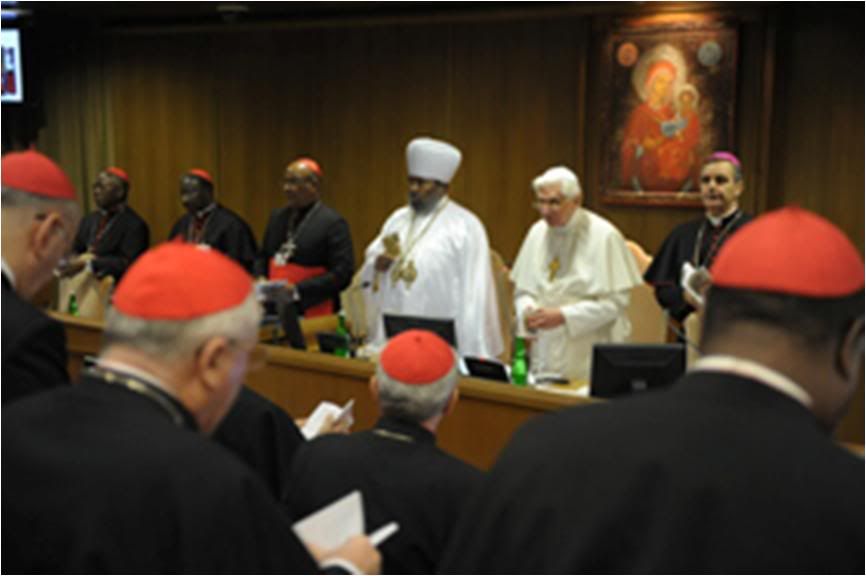
The President Delegate, His Eminence Cardinal Wilfrid Fox Napier, OFM, Archbishop of Durban (SOUTH AFRICA) presented His Holiness Abuna Paulus, Patriarch of the Ethiopian Tewahedo Orthodox Church (ETHIOPIA), with the following words:
I am certain that I express the sentiments of all of you when I say that we are very grateful to the Holy Father for inviting His Holiness Abuna Paulos, Patriarch of the Ethiopian Orthodox Church, to address this Special Assembly for Africa of the Synod of Bishops.
In His Holiness Abuna Paulos we will hear the voice of a Church that for nearly two thousand years has lived and borne testimony to the Gospel in Africa, giving rise to a Christian civilization of holy men and women, of social and cultural values and institutions that have farmed and informed the people and the nation at their very heart.
Just as the continent of Africa faces enormous challenges, so too do the Churches in Africa face painful tests and trials. His Holiness has personally experienced the rigours of jail and exile. The rich monastic, spiritual, liturgical and cultural life of the Ethiopian Church is a heritage of the Christian tradition to be cherished and loved by all of us.
Your Holiness, we will listen to your words with appreciation and gratitude.
Then His Holiness Abuna PAULUS offered a Reflection [I have posted the intervention in the CHURCH&VATICAN thread. It is a very informative, eye-opening overview of the history of Christianity in Africa.]
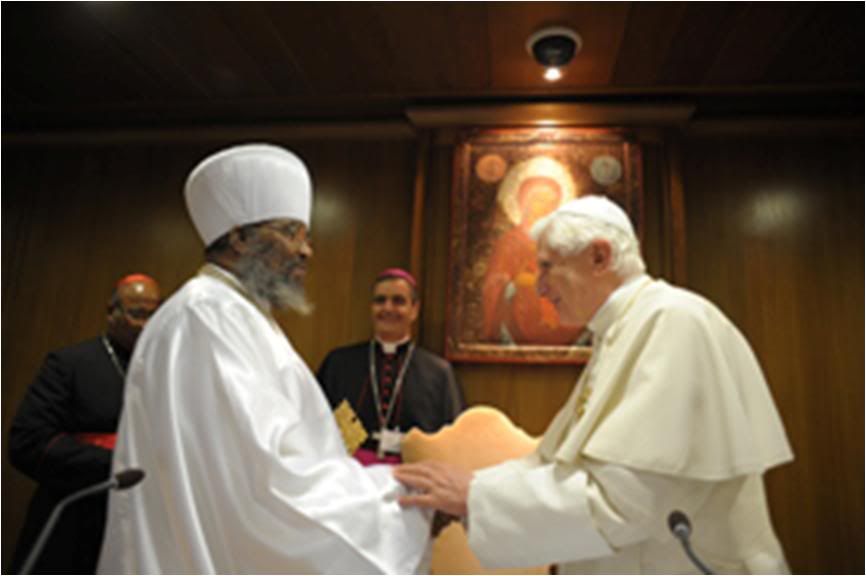
At the end, the Holy Father Benedict XVI responded to the Patriarch, with the following words, delivered in English:
BENEDICT XVI'S RESPONSE
TO PATRIARCH PAULUS
Your Holiness, I thank you wholeheartedly for your thoughtful presentation and for accepting my invitation to take part in the Second Special Assembly for Africa of the Synod of Bishops. I am sure that my gratitude and appreciation are shared by all the members of the Assembly.
Your presence bears eloquent witness to the antiquity and rich traditions of the Church in Africa. From apostolic times, among the many people yearning to hear Christ's message of salvation were those coming from Ethiopia (cf. Acts 8:26-40).
Your people's fidelity to the Gospel continues to be shown not only by their obedience to his law of love, but also, as you have reminded us, by perseverance amid persecution and the supreme sacrifice of martyrdom for the name of Christ.
Your Holiness has recalled that the proclamation of the Gospel cannot be separated from the commitment to build a society which conforms to God's will, respects the blessings of his creation and protects the dignity and innocence of all his children.
In Christ we know that reconciliation is possible, justice can prevail, peace can endure! This is the message of hope which we are called to proclaim. This is the promise which the people of Africa long to see fulfilled in our day.
Let us pray, then, that our Churches may draw closer in the unity which is the Holy Spirit's gift, and bear common witness to the hope brought by the Gospel.
Let us continue to work for the integral development of all Africa's peoples, strengthening the families which are the bulwark of African society, educating the young who are Africa's future, and contributing to the building of societies marked by honesty, integrity and solidarity.
May our deliberations during these weeks help Christ's followers throughout the continent to be convincing examples of righteousness, mercy and peace, and a light to guide the path of coming generations.
Your Holiness, once again I thank you for your presence and your valued reflections. May your participation in this Synod be a blessing for our Churches.”
At this General Congregation, which ended at 12.30 with the prayer Angelus Domini, 226 Fathers were present.
One must commend the Secretariat of the Bishops' Synod for the efficiency, promptness and comprehensive reporting of the synodal assembly conveninetly posted by language on their webpage
www.vatican.va/news_services/press/sinodo/documents/bollettino_23_ii_speciale-africa-2009/bollettino_23_ii_speciale-africa-2009_index...
They are posting bulletings twice a day, even, one for each session.
Fr. Lombardi would do well to find out what the Synod secretariat is doing right and adopt the procedures to the Vatican Press Office. It's a shame that the main Press Office itself cannot do as well as the Press Office of a Curial organism that's not even a dicastery!
[Modificato da TERESA BENEDETTA 07/10/2009 00:41] |
| |
 06/10/2009 18:39 06/10/2009 18:39 |
|
| | | OFFLINE | | Post: 18.570
Post: 1.223 | Registrato il: 28/08/2005
Registrato il: 20/01/2009 | Administratore | Utente Veteran | |
|

 The African side of Papa Ratzinger's Church:
The African side of Papa Ratzinger's Church:
Why the Pontiff continues to focus attention
on the continent of poverty and spirituality
by Luigi Accattoli
Translated from

Oct. 6, 2009
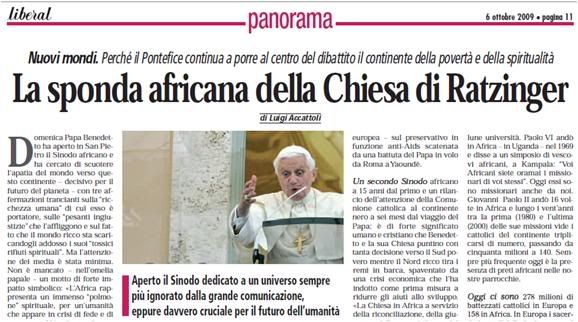 'The Synodal assembly opens, dedicated to a continent increasingly ignored
'The Synodal assembly opens, dedicated to a continent increasingly ignored
by the major media although it is really crucial to the future of mankind.'
On Sunday, Pope Benedict XVI opened the second Synodal assembly on Africa at the Vatican, seeking to shake the world out of its apathy towards the continent - which is decisive for the future of the planet - with three incisive comments on the 'human riches' which it has, the 'onerous injustices' that afflict it, and teh fact that the rich world is discharging its 'toxic spiritual wastes' on the continent.
But media attention was minimal.
The papal homily on Sunday did not lack a 'slogan' with great symbolic force: "Africa represents an immense spiritual 'lung' for a humanity that appears to be in a crisis of faith adn hope".
Strong words that met with scant attention. The Italian newspapers did not report the Pope's statements online Sunday nor did it make Page 1 of their paper editions yesterday.
The TV newscasts showed a few images from Sunday but only in reference to the Pope's solidarity with victims of the mudslides and flooding in Sicily.
As it was on the occasion of Benedict XVI's trip to Cameroon and Angola last March, one can bet that the world - which has always found it difficult to be concerned about Africa - will turn a deaf ear to this Synodal assembly.
The media world signals its disinterest mainly because of cultural laziness as well as under-estimating the occasion, in the belief that Africa is generally bad news, to be given in small doses.
I remember the feelings we had as Vaticanistas during the first Synodal assembly on Africa in the spring of 1994: While the bishops' meetings were going on, the genocide in Rwanda was unfolding, and therefore, there was quite an opportunity in Rome to interview the first-class intellectual leadership of the entire continent.
But space for Rwanda was minimal in the media, just as it was minimal last March for teh Pope's African visit - if one excludes the controversy - entirely European [and American] - over the usefulness of condoms against AIDS, after a statement made by the Pope on the flight to Cameroon.
A second African synod 15 years since the first one is a refocusing of the attention of the Church on the Black Continent six months since the Pope's visit.
It is of great human and Christian significance that Benedict and his Church have centered the attention of the Catholic communion towards the world's poor South while the rich North has drawn back, frightened by an economic crisis which has led the developed nations, as a first measure, to reduce development aid to poorer countries.
"The Church in Africa in the service of reconciliation, justice and peace" is the theme of this Synodal assembly. The agenda makes clear there is an awareness of what the Church wants to be able to do for Africa.
The attention of the Papacy to that suffering continent is not new. Without going all the way back to missionary efforts under Pius IX and Pius XI, who were the earliest committed advocates for Africa, one must remember that there were already black cardinals by the mid-20th century - that is, even before black Americans were allowed to register in some universities in the USA. [Governor Wallace standing at the gate of the University of Alabama to protest a black enrollee was in the early 1960s.]
Paul VI travelled to Africa - Uganda in 1969 - and told a symposium of African bishops in Kampala: "You Africans are now missionaries to your own people". Today they are missionaries even to us in Italy. The presence of African missionary priests in our parishes is becoming more frequent.
John Paul II travelled 16 times to Africa, and during the twenty years between his first trip (1980) and the last (2000), the Catholics on the continent almost tripled in number, from 50 million to 140 million.
Today there are 278 million baptized Catholics in all of Europe and 158 million in Africa. But in Europe the number of Catholic priests has been diminishing annually by at least a thousand, while the number of priests in Africa is growing annually by the same number.
Working on the basis of these figures and hypothesizing that the present trend continues, the Jesuit magazine Popoli forecasts that the number of African Catholics could surpass those of Europe within 25 years.
That rapid and providential growth is the primary reason for Pope Benedict XVI's interest in Africa. [After the more compelling reason of wanting to help all peoples who are most in material and spiritual need.]
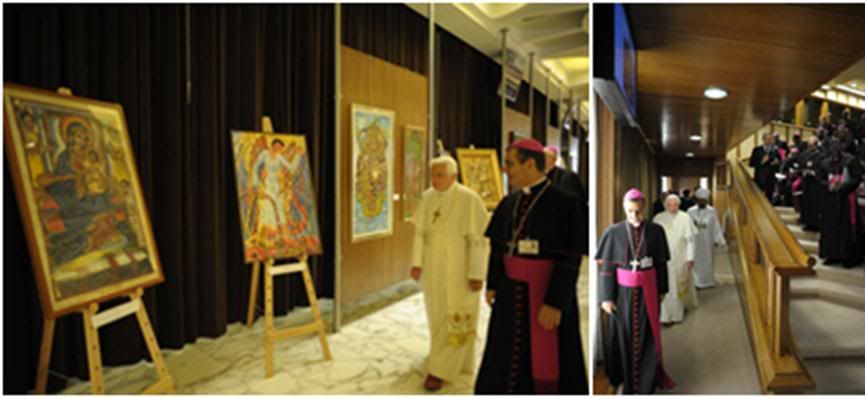 The Holy Father on his way to this morning's General Congregation.
A similar article to Accattoli's:
And the silence of the press
The Holy Father on his way to this morning's General Congregation.
A similar article to Accattoli's:
And the silence of the press
descends on the Pope's words
by Lucio Brunelli
Translated from

Oct. 5, 2009
There was no lack of interesting highlights - 'news', we journalists would say - in the opening Mass for the Synodal assembly on Africa.
In St. Peter's Basilica, before a crowd of African cardinals and bishops, the Pope pronounced strong words freely.
The old colonialism is done with, the Pope said, but a new colonialism threatens the vast continent which is across the sea from us. The First World does not only depredate Africa for its natural resources, but exports and discharges its 'toxic spiritual wastes' on the southern part of the planet.
That is an accusation that is harsh and impassioned, that only someone who has no interests to protect could formulate with clarity and freedom.
And yet the two major newspapers online [ Corriere della Sera and La Repubblica] carried not a single line Sunday afternoon after the Mass about the African synod and the words of the Pope.
And this is far from whining victimism which equates the media visibility of the Catholic Church with begging for a bit more column inches in the press.
Observant Catholics are a minority in this nation and they know that the terms most appropriate to the Christian vocabulary - faith, hope and charity - say humanly little or nothing at all to the wider public. It's not a question of ill will, simply the reality of secularization.
But this is a different case altogether. It has to do with the quality and honor of the information itself.
Thus far, the Pope makes the news only if he can be portrayed as extreme on moral issues. Or exploited, from time to time, by one of the two opposing political 'fan clubs' which use nespapers and TV as their virtual stadium.
Papa Ratzinger on Africa apparently interests the media only if he launches new anathemas against condoms. He is of no interest when he unmasks the altars of the great powers, or if he gives voice - for almost a month at the Vatican - to the bishops of the continent that has the highest demographic increases in the world.
A continent that we should all be interested in and know better, if only for selfish reasons, because her destiny always concerns our own as well.
Cardinal Angelo Bagnasco was right when he said that the secular world would prefer a Church that is subservient and mute.
But reporting information selectively hurts our own profession as journalists, even before it offends the faithful.
Whether the newspaper is rightist or leftist, things have not changed - i.e., who cares about Africa and its tragedies? At most, we will concern ourselves with saying Yes or No to whether illegal immigrants should be driven back from Italian shores (without asking why and from where these unfortunate people are fleeing].
Problem #1 in the Italian media is not the little freedom that the press enjoys. It is the disconcerting degradation of the information reported. Its contents, the poltical stagecraft that straddles everything, the failure to report realities seen from below, by the citizens, and the absence of an open outlook on the world.
Whether it is the TV newscasts on channels that belong to a political leader or on the leading private commercial TV. When both combine, it certainly is not insignificant. But even newspapers that belong to various houses of capitalism leave the impression of a fake pluralism. Which is bad.
This silence about the African synod is not a good sign, because it is not right to report the Church only for its caricaturish traits or whatever happens to be exploitable for political purposes of the moment.
And that's degradation of information. But TV and newspapers are merely the mirror of what the public wants and deserves: this is the response given in an attempt to shut up those who demand more worthy news. It is upto all of us to prove that they are wrong.
[Modificato da TERESA BENEDETTA 07/10/2009 13:11] |
| |
 07/10/2009 14:53 07/10/2009 14:53 |
|
| | | OFFLINE | | Post: 18.574
Post: 1.227 | Registrato il: 28/08/2005
Registrato il: 20/01/2009 | Administratore | Utente Veteran | |
|
 Wednesday, Oct. 7
Wednesday, Oct. 7
 FEAST OF OUR LADY OF THE ROSARY
FEAST OF OUR LADY OF THE ROSARY
Although the rosary had been prayed in some form as early as the second century, St. Dominic is credited with
institutionalizing it as a devotion after a vision of the Virgin Mary in 1208. In 1541, the victory of the Holy Fleet
against the Ottoman Turks in the naval battle of Lepanto off western Greece was attributed to Our Lady of the Rosary,
and the October feast was instituted 30 years later.
Illustrations, from left: Sculpture of St Dominic and the Virgin of the Rosary; Battle of Lepanto, by Veronese, 1572; prayer card to the Virgin of the Rosary;
image of Our Lady of Pompeii with Sts. Dominic and Catherine; Mysteries of the Rosary, Lorenzo Lotto, 1539; stained glass window of St. Dominic and the rosary.
OR today.
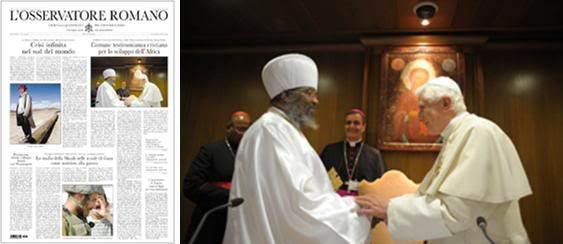
The Patriarch of the Ethiopian Orthodox Church addresses the Synodal Assembly:
A common Christian testimony for the development of Africa
 The issue contains the full texts of Patriarch Paulus's intervention adn the response of the Holy Father, as well as summaries of the interventions during the third general congregation of the Synodal Assembly. Page 1 international news: IMF forecasts 90 million 'new poor' in the world's South; UN proposes to teach Palestinians about the Shoah in Gaza schools as an antidote to further conflict; and North Korea seeks direct talks with the USA.
THE POPE'S DAY
The issue contains the full texts of Patriarch Paulus's intervention adn the response of the Holy Father, as well as summaries of the interventions during the third general congregation of the Synodal Assembly. Page 1 international news: IMF forecasts 90 million 'new poor' in the world's South; UN proposes to teach Palestinians about the Shoah in Gaza schools as an antidote to further conflict; and North Korea seeks direct talks with the USA.
THE POPE'S DAY
General Audience - The Holy Father spoke on the 17th century reformist priest St. Giovanni Leonardi, whose missionary zeal
led to the establishment of Propaganda Fide, the mother institution for the present Congregation for the Evangelization
of peoples.
The Holy Father attended the afternoon session of the Synodal Assembly. In the morning, the participants
visited the Mayor of Rome, after which they held their first working group sessions. They resumed the general
congregation (the fifth) in the afternoon.
[Modificato da TERESA BENEDETTA 08/10/2009 01:48] |
| |
 07/10/2009 15:25 07/10/2009 15:25 |
|
| | | OFFLINE | | Post: 18.575
Post: 1.228 | Registrato il: 28/08/2005
Registrato il: 20/01/2009 | Administratore | Utente Veteran | |
|
 GENERAL AUDIENCE TODAY
GENERAL AUDIENCE TODAY
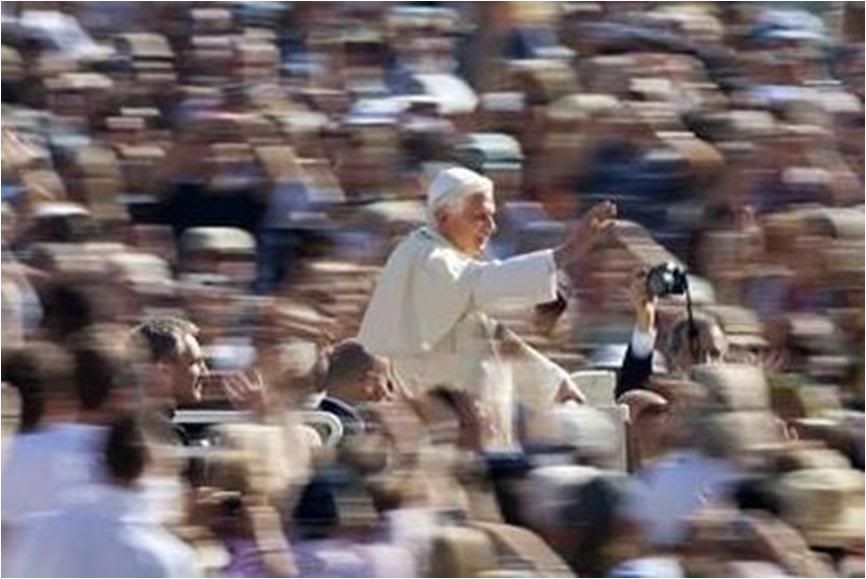
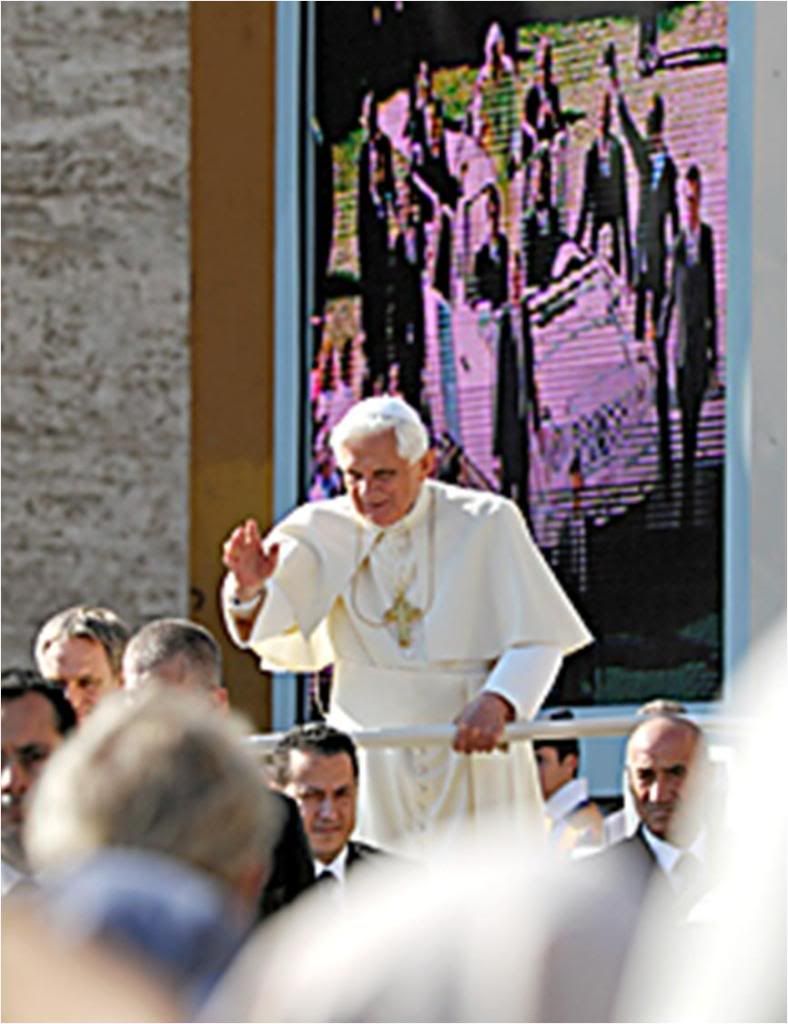
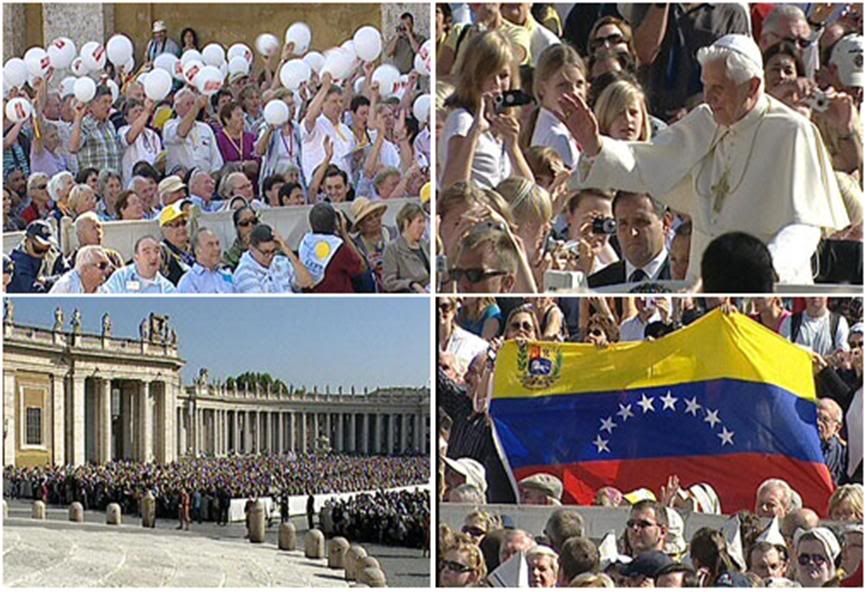
The Holy Father held the General Audience at St. Peter's Square at 10:30 this morning, with a catechesis on St. Giovanni Leonardi (John Leonard).
Here is how he synthesized the catechesis in English:
This week marks the four hundredth anniversary of the death of Saint John Leonardi, the founder of the Clerks Regular of the Mother of God and a priest whose missionary zeal found expression in the establishment of the congregation of Propaganda Fide.
Saint John was born near Lucca, and after training as a pharmacist, became a priest committed to offering "the medicine of God" to the men and women of his time. At a period of great reform and renewal in the life of the Church, he made the crucified Christ the centre of his preaching and the criterion of all his activity.
John understood that all true reform is born of fidelity to Christ and love for the Church. It was love for Christ which inspired his efforts to catechize the young, to promote missionary activity and to renew Christian life and practice.
Saint John was convinced that Christ is the true measure of man, and so he worked with great realism and zeal to promote holiness and the reform of society.
During this Year for Priests, may the figure of this great missionary inspire priests and laity alike to "start anew from Christ" and embrace their vocation with passionate enthusiasm.
I offer a warm welcome to the English-speaking visitors at today’s Audience, including the Sisters and friends of the Congregation of Jesus and the Institute of the Blessed Virgin Mary, celebrating the four hundredth anniversary of their foundation by Mary Ward.
My particular greetings go to the groups of faithful from Iraq, from the Archdiocese of Samoa-Apia, and to the Diaconate ordination candidates from the Pontifical North American College accompanied by their families and friends. Upon all of you I invoke God’s blessings of joy and peace!
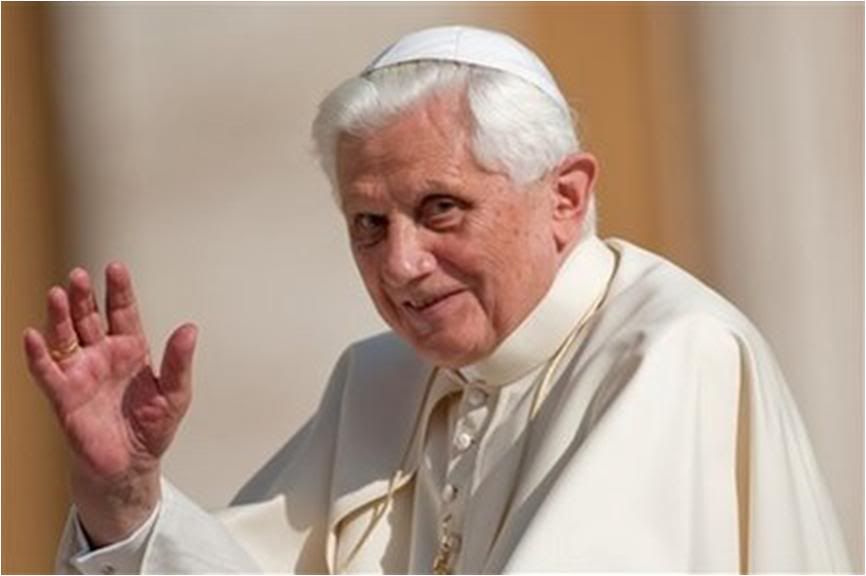
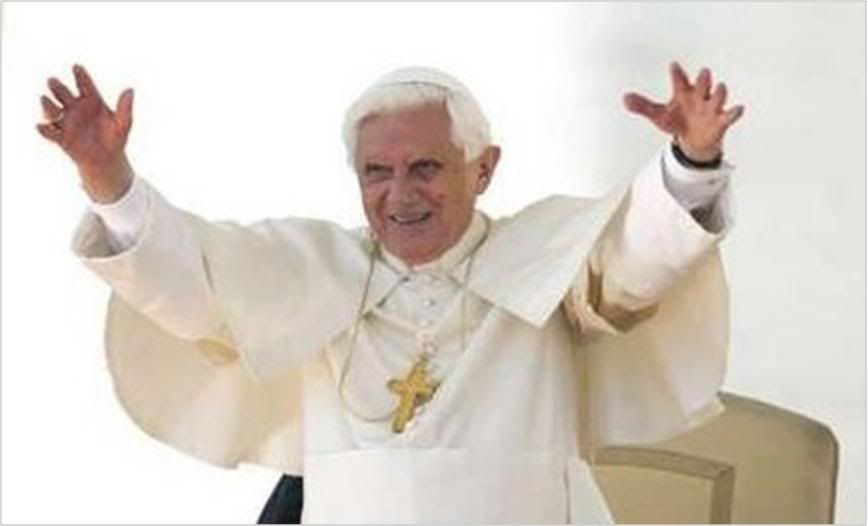
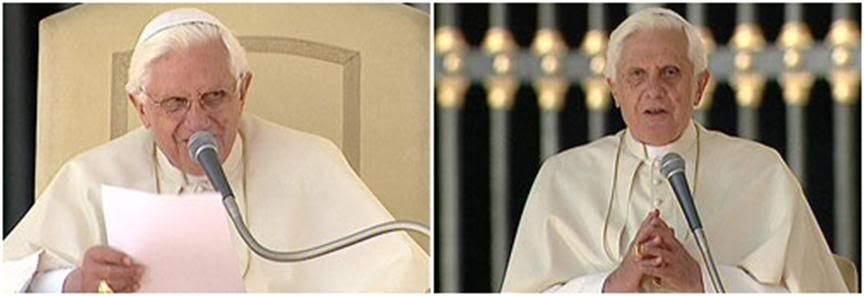 Here is a translation of the Holy father's full catechesis:
Here is a translation of the Holy father's full catechesis:
CATECHESIS ON
ST. GIOVANNI LEONARDI
Dear brothers and sisters!
The day after tomorrow, October 9, we will celebrate the 400th anniversary of the death of St. Giovanni Leonardi, founder of the religious Order of Clerks Regular of the Mother of God, canonized on April 17, 1938, and named patron saint of pharmacists on August 8, 2006.
He is also remembered for his great missionary zeal. Together with Mons. Juan Bautista Vives and the Jesuit Martin de Funes, he planned and contributed to the institution of a specific Congregation for missions in the Holy See, that of Propaganda Fide [Propagating the Faith, now called Evangelization of Peoples], and to the future birth of the Collegio Urbano di Propaganda Fide, which in the course of centuries has forged thousands of priests, many of them martyrs, to evangelize peoples.
Therefore, I am happy to cite this luminous figure of a priest as an example for all priests in this Year for Priests. He died in 1609 from influenza which he caught while devoting himself to the care of those who had been struck by an epidemic in the Roman quarter of Campitelli.
Giovanni Leonardi was born in 1641 in Diecimo, province of Lucca (Tuscany). The youngest of seven brothers, his youth was marked by the rhythms of faith lived in a healthy and industrious nuclear family, as well as assiduous apprenticeship in a shop for perfumes and medicaments in his hometown.
At age 17, he was enrolled by his father in a regular course of compounding in Lucca, with a view to becoming a pharmacist, or a 'specialist, as they were called then.
For almost a decade, the young Giovanni was an attentive and diligent student but when, under the norms prescribed by the then Republic of Lucca, he finally acquired the official recognition that would have allowed him to open a pharmacy, he started to wonder whether the time had come instead to carry out a plan that he had long nurtured in his heart.
After mature reflection, he decided to prepare for the priesthood. Thus, leaving the pharmacist's boutique, and having acquired adequate theological formation, he was ordained a priest, and celebrated his first Mass on the Feast of the Epiphany in 1572.
Nonetheless, he did not abandon his passion for the pharmacopoeia, because he felt that the profession of pharmacist would allow him to realize his vocation more fully - that is, to transmit to all men, through a holy life, 'the medicine of God', Jesus Christ crucified and risen, 'the measure of all things'.
Inspired by his belief that such medicine was required by all human beings more than any other thing, St. Giovanni Leonardi sought to make the personal encounter with Jesus Christ the fundamental reason for his own existence.
"It is necessary to start over with Christ", he liked to say. The primacy of Christ over everything became for him the concrete criterion for judgment and action, and the principal generator of his own priestly activity, which he carried out at a time when there was a vast and widespread spiritual renewal in the Church, thanks to the flowering of new religious institutes and to the luminous testimony of saints like Carlo Borromeo, Filippo Neri, Ignacio de Loyola, Giuseppe Calasanzio, Camille de Lellis, Luigi (Aloysius) Gonzaga.
With enthusiasm, he dedicated himself to apostolate among children and young people through the Compagnia della Dottrina Cristiana, gathering about him a group of young people with whom, on September 1,, 1574, he established the Congregation of Reformed Priests of the Virgin Mary, later called the Order of Clerks Regular of the Mother of God.
He exhorted his disciples "to have before the eyes of the mind only the honor, service and glory of Jesus Christ crucified", and as a good pharmacist accustomed to dosing out potions precisely, he added: "Lift up your hearts just a little more to God, and with him, take the measure of things".
Moved by apostolic zeal, in May 1605, he sent the newly elected Pope Paul V a memorandum suggesting criteria for an authentic renewal of the Church.
Observing "how necessary it was that those who aspire to reform the habits of men should seek, especially and first of all, the glory of God", adding that they should shine out "with the integrity of their life and thexcellence of their own habits, so that they may be able to demand and attract reform gently".
He also observed that "those who want to effect serious religious and moral reform should, like a good physician, first make a careful diagnosis of the ailments that trouble the Church in order to be able to prescribe for each of those ills the most appropriate remedy".
He noted that "the renewal of the Church should take place equally among the chiefs as well as their subordinates, on high as below. It should begin with those who command and extend down to their subjects".
Beause of this, while he asked the Pope to promote 'universal reform of the Church' he concerned himself with the Christian formation of the people, especially of children, who had to be "educated from their early years... in the purity of the Christian faith and in holy practices".
Dear brothers and sisters, the luminous figure of this saint invites all priests in the first place, and all Christians, to constantly aim towards 'the high standard of Christian living' which is holiness, each one, naturally, according to his own status.
Indeed, authentic ecclesial renewal can only come from faithfulness to Christ. In those years, during the cultural and social transition between the 16th and 17th centuries, the premises of future contemporary culture started to emerge, characterized by an undue scission between faith an reason, whose negative results included the marginalization of God, with the illusion that man could have total autonomy in choosing to live 'as if God did not exist'.
It is the crisis of modern thought, which has many times shown to have established itself often in forms of relativism. Giovanni LeonardI sensed what would be the true medicine for these spiritual ailments and synthesized it in the expression "Christ first of all' - Christ in the center of the human heart, in the center of history and of the cosmos.
He stated firmly that mankind had extreme need of Christ because he is our 'measure'. There is no area that cannot be touched by his power. There is no ailment that cannot find remedy in him. There is no problem that cannot be resolved in him.
"Christ or nothing!" This was his prescription for every type of spiritual and social reform.
There is another aspect of St. Giovanni Leonardi's spirituality that I am happy to underscore. On many occasions, he reiterated that the living encounter with Christ is realized in his Church, holy but fragile, rooted in history and sometimes obscured, where good grain and weeds grow together (cfr Mt 13,30), but nonetheless, always a sacrament of salvation.
With lucid awareness that the Church is the field of God (cfr Mt 13,24), he was not scandalized by her human weaknesses. To fight the weeds, he chose to be the good grain: that is, he decided to love Christ in the Church and to contribute to make her ever more a transparent sign of Christ.
He saw the Church with great realism, her human fragility, but also her being 'the field of God', his instrument for the salvation of man.
Not only that. For love of Christ, he worked with alacrity to purify the Church, to make her more beautiful and holy. He understood that every reform must be made within the Church, never against the Church.
In this, St. Giovanni Leonardi was truly extraordinary and his example always remains actual. Every reform certainly involves structures, but in the first place, it must impact the hearts of the faithful.
Only holy persons - men and women who allow themselves to be led by the divine Spirit - ready to carry out radical and courageous choices in the light of the Gospel can renew the Church and contribute in a decisive manner to build a better world.
Dear brothers and sisters, the existence of St. Giovanni Leonardi was always illuminated by the splendor of the Holy Face of Jesus, kept and venerated in the Cathedral of Lucca - it has become the eloquent symbol and undisputed synthesis of the faith that animated him.
Conquered by Christ as the Apostle Paul was, he showed his disciples - and continues to show all of us - the Christocentric ideal for which "one must strip oneself of all selfish interests and be concerned only with service to God, ... having before the eyes of the mind only the honor, service and glory of Christ Jesus crucified".
Alognside the Face of Jesus, he looked to the maternal face of Mary. She whom he chose to the patron of his Order, was for him teacher, sister, mother, and he experienced her constant protection.
May the example and intercession of this 'fascinating man of God', particularly in this Year for Priests, be a reminder and encouragement for all priests and for all Christians to live their own vocations with passion and enthusiasm.
In his plurilingual greetings, the Holy Father referred to the Feast of Our Lady of the Rosary today, and entrusted the work of the current Synodal assembly on Africa to her.
To Italian pilgrims, he recalled the "importance' of the Marian prayer "so dear even to my venerated predecessors". He particularly called on the youth, the sick and newlyweds to place the Rosary at the center of their Christian life.
He also greeted Cardinal Ivan Dias and his co-workers at the Congregation for the Evangelization of Peoples, the officials and students of the Pontificio Collegio Urbano di Propaganda Fide, the participants of a pilgrimage promoted by the Order of the Mother of God, the priests, religious and seminarians of the Institute of Christ the King, and representatives of the Italian association 'Pianeta Down' (Planet Down - families with Down Syndrome
children).
To a delegation from Roio in L'Aquila, he said, "To the Virgin Mary of the Cross, who is venerated in the Shrine at Roio, I entrust once more the hopes and expectations of the peoples who were struck by the earthquake in March".
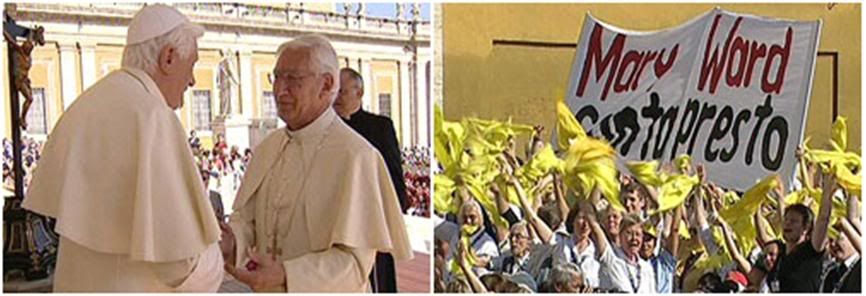
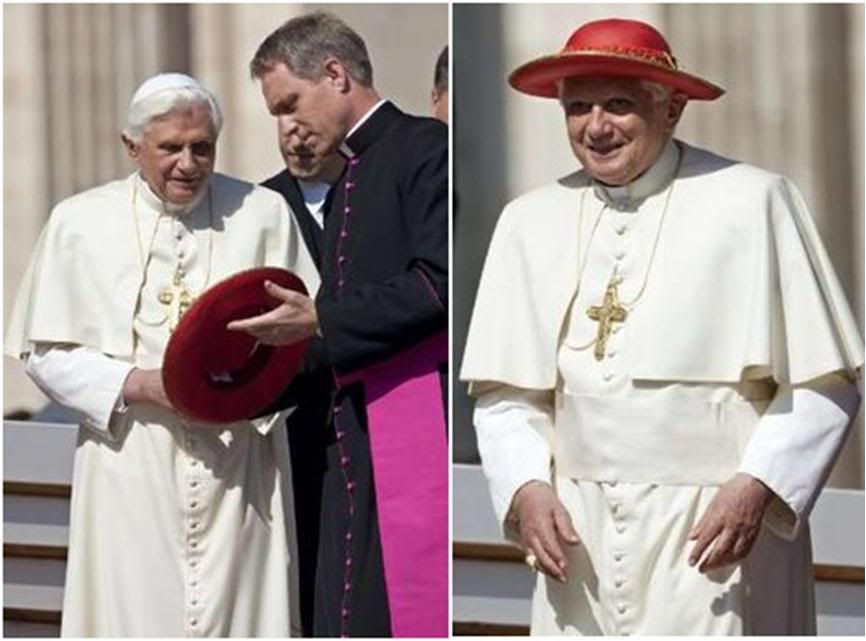
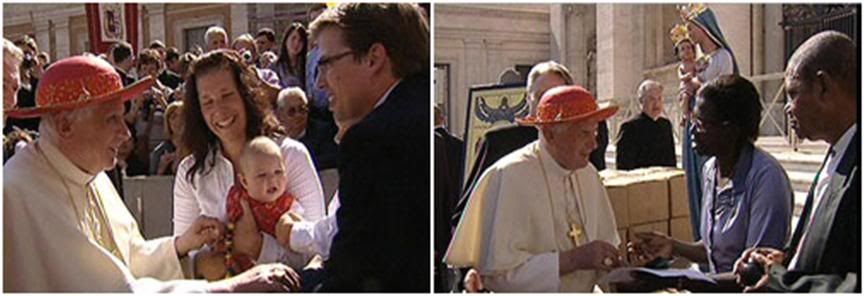 Below, the Holy Father meets a teenage boy with Down Syndrome
Below, the Holy Father meets a teenage boy with Down Syndrome.
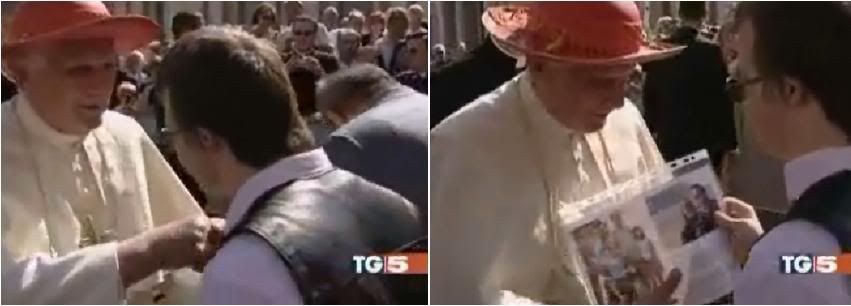
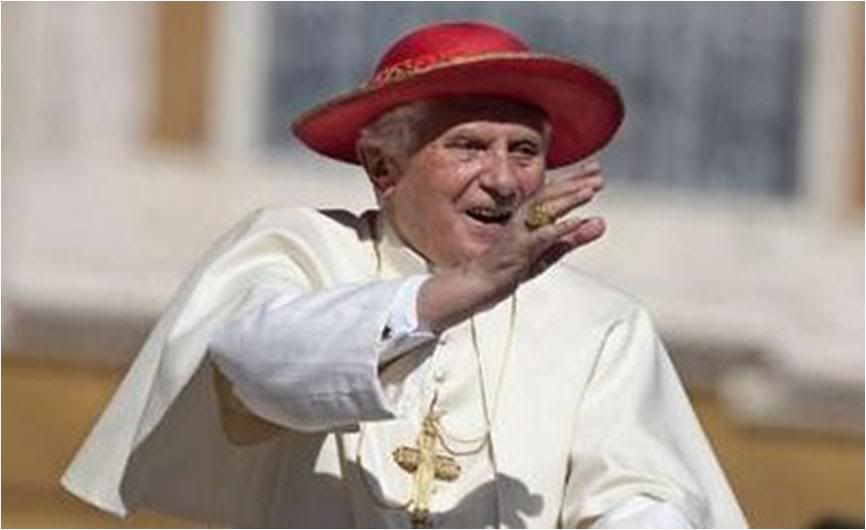 What an elegant and joyous, youthful and vigorous, truly amazing figure the Holy Father is!
Pope Benedict XVI greets
What an elegant and joyous, youthful and vigorous, truly amazing figure the Holy Father is!
Pope Benedict XVI greets
Hawaii's 'miracle woman'
By Mary Vorsino

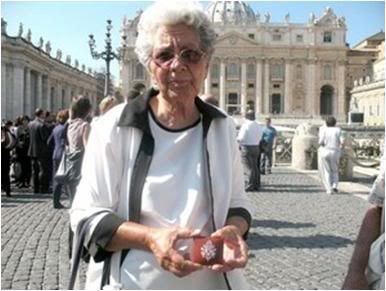
ROME — Aiea resident Audrey Toguchi, the woman at the heart of the second miracle attributed to Father Damien, met Pope Benedict XVI today during a general audience in St. Peter's Square.
Toguchi was in a special section of VIPs who sat in a section on the steps, near the Pope.
"In my whole life, I never thought I'd be so close to the Pope," said Toguchi. "I'm numb."
About 500 Hawaii pilgrims were in the general seating area in St. Peter's Square. They cheered when the group was mentioned as among those visiting the Vatican.
The Hawaii residents are on a pilgrimage for Father Damien's canonization, which will take place Sunday in St. Peter's Square.
Toguchi said Pope Benedict XVI struck her as a very kind person. He greeted her and others in the VIP section after the general audience.
Toguchi said she thanked the Pope for canonizing Father Damien. She also asked him to bless a packet of Father Damien medals.
Toguchi and her husband, Yukio, kissed the Pope's ring.
Toguchi's cure from lung cancer after praying to Father Damien was the second miracle attributed to the priest, assuring his canonization.
[Modificato da TERESA BENEDETTA 08/10/2009 19:55] |
| |
 07/10/2009 22:55 07/10/2009 22:55 |
|
| | | OFFLINE | | Post: 18.579
Post: 1.232 | Registrato il: 28/08/2005
Registrato il: 20/01/2009 | Administratore | Utente Veteran | |
|

 Portuguese bishops:
Portuguese bishops:
Papal visit is a pilgrimage
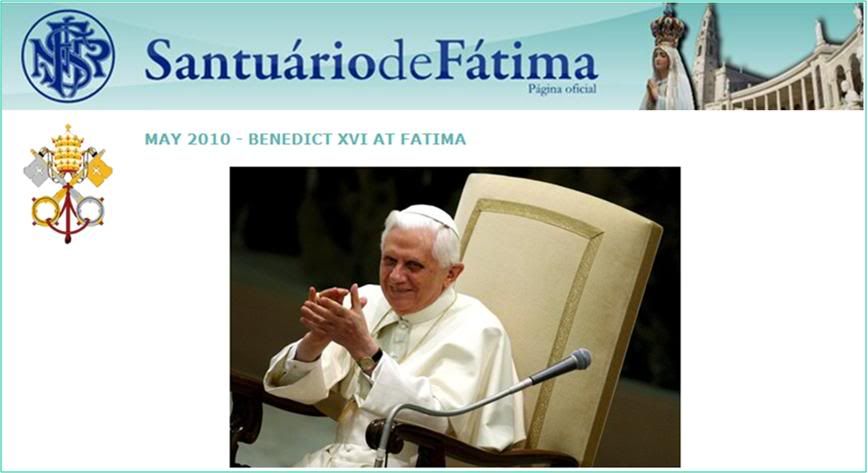
LISBON, Portugal, OCT. 7, 2009 (Zenit.org).- Benedict XVI will visit Portugal in 2010 as a "pilgrim of Fatima," the prelates of that country are affirming.
The Portuguese bishops' conference stated this in a pastoral note MADE Monday, in which they spoke about the Pope's upcoming May 12-13 visit to the Marian shrine.
The bishops said that they perceive "jubilation and joy in our people" over the Papal visit, which "is the realization of a long awaited desire that very much honors and distinguishes us."
The conference expressed heartfelt gratitude toward the Holy Father for planning this trip. The bishops stated that they wish to correspond to this honor with "the love for the Pope that is a profound dimension of Portuguese Catholicism."
The note explained, "Visible communion with the Successor of Peter, physically present among us, will be, once again, the occasion of a spontaneous expression of that love for his person, his teaching and his universal service and fidelity to the Church."
The prelates stated that the Holy Father will go to the country "essentially as a pilgrim of Fatima," where he will encounter a "lively expression of all the Churches of Portugal."
The Pontiff's visit to Fatima coincides with the 10th anniversary of the beatification of the little shepherds Francisco and Jacinta, and with the commemoration of the centenary of the latter's birth.
The bishops acknowledged that the trip is also "projected in the wider horizon of [Benedict XVI's] pilgrimages to the principal Marian shrines spread around the world as great centers of evangelization."
"When the Pope makes himself a pilgrim in his capacity of universal pastor of the Church, the whole Church goes on pilgrimage with him; that is why this pilgrimage of his has great pastoral, doctrinal and spiritual meaning," notes the communique.
The prelates expressed the hope that the Holy Father's visit will encourage "constant and generous commitment in the work of evangelization, helping to move from a traditional religiosity to an adult and reasoned faith."
They described this faith as capable of giving "courageous witness in private and public, that is able to address the challenges of secularism and of doctrinal and ethical relativism, typical of our time, of which Benedict XVI often reminds us."
The conference explained that the program of the Papal visit is yet to be defined, and will be discussed by the prelates in their forthcoming assembly in November.
The bishops invited the faithful "to truly receive the Holy Father, as Successor of Peter who comes to confirm brothers in the faith, with affection and personal participation, being united in prayer for his intentions for the Church and for the great aspirations of humanity."
An earlier report posted on the Fatima website said this:
Bishops thank Pope for
accepting invitation to Fatima

FATIMA, Oct. 6 - The schedule of the Holy Father’s visit to Portugal has not been set yet. It will be set by the next Assembly of the Bishops, gathered in the House of Our Lady of Sorrows, at the Shrine of Fatima, on Nov. 9-12.
[May 12-13 was mentioned in earlier press releases from the Shrine.]
The pilgrimage of the Holy Father to Portugal was one of the main items on the calendar of the meeting of the Permanent Council of the Bishops Conference of Portugal (CEP), which took place at Fatima today.
The Pastoral Brief coming out of this meeting emphasizes, first of all, the “joy and gratitude” with which the Church in Portugal welcomed the announcement of the visit of the Pope to the Country on May 2010.
The document presented to the journalists emphasizes also the important role of the Shrine of Fatima, “where the Message of Our Lady is made live and timely”, as “an important element for evangelization and edification of the Church in our Country”.
The Bishops urge the faithful – through Mary, “Star of Hope”, because She points constantly the goal, the happy harbor, the eternal and definitive communion with God and with all men – to know how “to welcome and accompany the pilgrim Pope” in Portugal, “with joy, enthusiasm and filial devotion”.
[Modificato da TERESA BENEDETTA 08/10/2009 19:18] |
| |
 08/10/2009 13:25 08/10/2009 13:25 |
|
| | | OFFLINE | | Post: 18.581
Post: 1.234 | Registrato il: 28/08/2005
Registrato il: 20/01/2009 | Administratore | Utente Veteran | |
|
 Thursday, Oct. 8
Thursday, Oct. 8
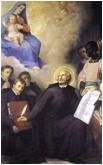 ST. GIOVANNI LEONARDI (Italy, 1541-1608)
ST. GIOVANNI LEONARDI (Italy, 1541-1608)
Confessor, Founder of the Clerks-Regular of the Mother of God
He was the subject of the Pope's GA catechesis yesterday.
OR today.
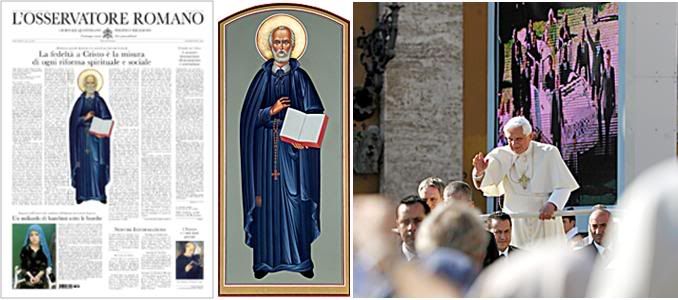
At the General Audience, Benedict XVI talks about St. Giovanni Leonardi:
Faithfulness to Christ is the measure of every spiritual and social reform
Other Page 1 stories: At the Synodal assembly on Africa, bishops denounce exploitation and corruption on the continent;
UNICEF says a survey conducted in 37 countries in 2007 shows more than a billion children live in countries with ongoing
armed conflicts, of which 300 million are under age 5; and that 86% of children in these countries also suffer other
violations from corporal punishment to psychological problems.
THE POPE'S DAY
The Holy Father met today with
- H.E. Mahmoud Abbas, President of the Palestinian National Authority and the Palestinian Liberation
Organization, with his delegation.
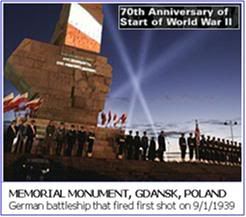
This evening, the Holy Father will attend a concert organized by Youth Against War with an inter-regional
youth orchestra from Germany performing Mahler and Mendelssohn at the Auditorium on Via della Conciliazione
to mark the 70th anniversary of the start of World War II.
[Modificato da TERESA BENEDETTA 08/10/2009 15:45] |
| |
 08/10/2009 18:48 08/10/2009 18:48 |
|
| | | OFFLINE | | Post: 18.587
Post: 1.240 | Registrato il: 28/08/2005
Registrato il: 20/01/2009 | Administratore | Utente Veteran | |
|
 Pope meets President Abbas again
Pope meets President Abbas again

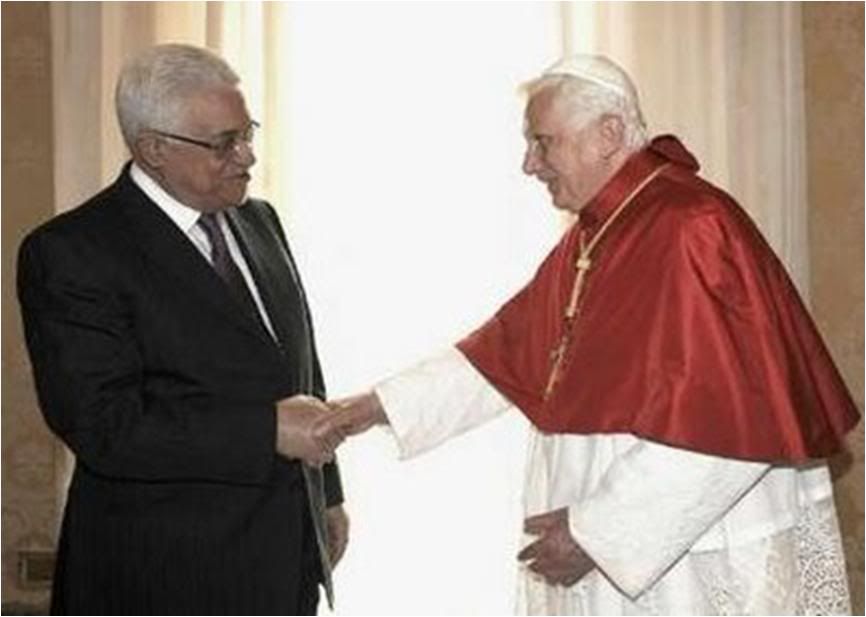
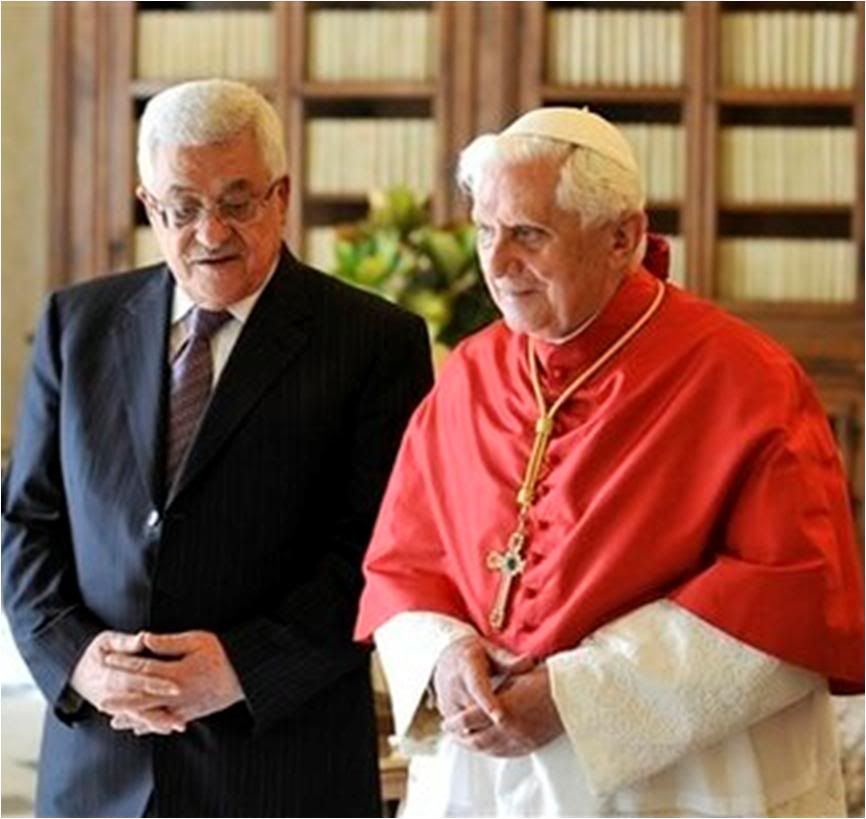
Vatican City, Oct. 8 (dpa) - Pope Benedict XVI in talks Wednesday with Palestinian President Mahmoud Abbas expressed hope that a "just and lasting solution," would be found to the Israeli-Palestinian conflict.
During their 15-minute meeting in the Apostolic Palace the two leaders held "cordial discussions" in which they also recalled Benedict's trip to the Holy Land earlier this year, the Vatican said in a statement.
"The dialogue focused on the situation in the Middle East and, in particular, on the need to find a just and lasting solution to the Israeli-Palestinian conflict, in which the rights of everyone are recognized and respected," the statement said.
"In this context, emphasis was given to the importance of co-operation and mutual respect between the parties involved, and of the support of the international community," it added.
"Reference was also made to the situation of Catholics in Palestine, and in the region more generally, and to the contribution they make to social life and to peaceful coexistence among peoples," the statement said.
[During his pilgrimage to the Holy Land last May, the Holy Father spent a day in Bethlehem as the guest of President Abbas.]
During their meeting the two exchanged gifts with Abbas offering the Pontiff a mosaic depicting an image of ancient Jerusalem, inscribed in Arabic with the words "Jerusalem the capital of Arab culture."
Benedict in exchange gifted the Palestinian president an image of St Peter's Square in bas relief made of pewter and ceramic.
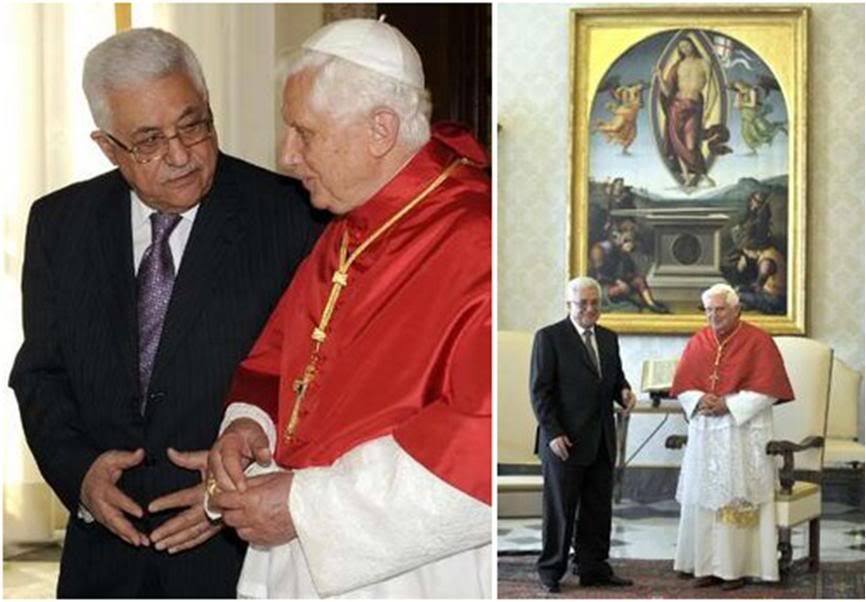 Pope meets with President Abbas
Pope meets with President Abbas

08 Oct 09 (RV) - Pope Benedict has called for a "just and lasting" solution to the conflict between Israelis and Palestinians, in which "the rights of all are recognized and respected."
The Pope’s message was contained in aVatican Press Office statement released following his private audience with Mahmoud Abbas, president of the Palestinian Authority.
President Abbas was also received by Cardinal Tarcisio Bertone, Secretary of State, and Msgr. Dominique Mamberti, Secretary for Relations with States.
The talks were held in Pope Benedict XVI’s private library and lasted about 15 minutes. But before the doors were closed upon the two men the Pope was heard asking Abbas about the outcome of recent meetings in New York with Israeli Prime Minister Benjamin Netanyahu and U.S. President Barack Obama.
After the private meeting, President Abbas presented the Pope members of his entourage, among others, Saeb Erekat, who is leading negotiations with the Israelis, commenting that "he has a very important job to do."
During Thursday's meeting, Abbas presented Benedict with a tiled scene of Old Jerusalem with the words “Jerusalem, capital of Arab culture” written in Arabic and English.
Pope Benedict, for his part, presented Abbas with a large pewter bas relief depicting St. Peter's Square.
The text of the Vatican communqiue after the meeting:
This morning in the Vatican Apostolic Palace, the Holy Father Benedict XVI received in audience Mahmoud Abbas, president of the Palestinian Authority.
President Abbas subsequently went on to meet Cardinal Secretary of State Tarcisio Bertone S.D.B. who was accompanied by Archbishop Dominique Mamberti, secretary for Relations with States.
During the cordial discussions, having recalled the Holy Father's own recent trip to the Holy Land, the dialogue focused on the situation in the Middle East and, in particular, on the need to find a just and lasting solution to the Israeli-Palestinian conflict, in which the rights of everyone are recognised and respected. In this context, emphasis was given to the importance of co-operation and mutual respect between the parties involved, and of the support of the international community.
Reference was also made to the situation of Catholics in Palestine, and in the region more generally, and to the contribution they make to social life and to peaceful coexistence among peoples.
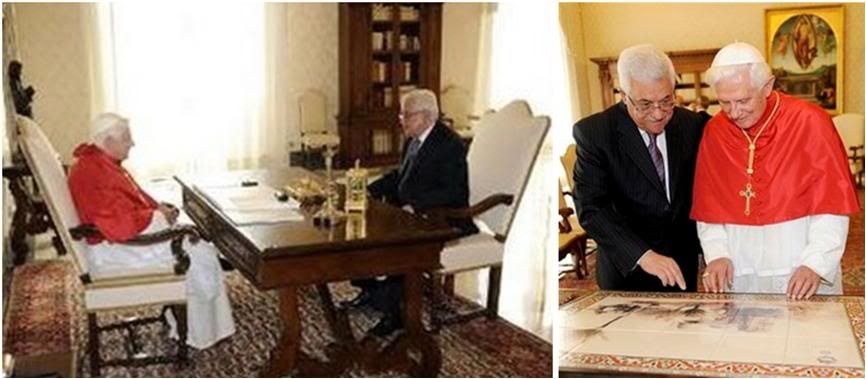
[Modificato da TERESA BENEDETTA 08/10/2009 20:21] |
| |
 09/10/2009 00:44 09/10/2009 00:44 |
|
| | | OFFLINE | | Post: 18.590
Post: 1.243 | Registrato il: 28/08/2005
Registrato il: 20/01/2009 | Administratore | Utente Veteran | |
|
 I am taking a closer look at Italian MP Luca Volonte (born 1966 and first elected to the Italian Parliament in 1996), a C&L member, whose article on Benedict XVI as our 'only wall against relativism' I translated and posted on the preceding page of this thread last week.
I am taking a closer look at Italian MP Luca Volonte (born 1966 and first elected to the Italian Parliament in 1996), a C&L member, whose article on Benedict XVI as our 'only wall against relativism' I translated and posted on the preceding page of this thread last week.
From that article, I found a formulation that is quite original and worth remembering: "Relativism...is itself a terrible atheism that is simply based on self, what one might call egotheism".
Now, Volonte has written a commentary that he furnished Lella who promptly posted it on her blog
 It may yet appear in one of the Italian dailies, but in any case, he has proven more 'alert' than the usual Vatican commentators in picking up the most memorable statement from the Holy Father's catechesis yesterday on St. Giovanni Leonardi:
Benedict XVI says:
It may yet appear in one of the Italian dailies, but in any case, he has proven more 'alert' than the usual Vatican commentators in picking up the most memorable statement from the Holy Father's catechesis yesterday on St. Giovanni Leonardi:
Benedict XVI says:
'Reform must be within the Church,
not against the Church'
by LUCA VOLONTE
Member, Chamber of Deputies
Italian Parliament
Oct. 8, 2009
"Not against but within the Church' there is need for reform.
The crescendo of words from Pope Benedict XVI on the Catholic church, which he started with the Via Crucis meditation of 2005 and Culminated in his letter to the bishops of the world in March found an important confirmation yesterday, even as he spoke of a reform to make the Church 'more beautiful and more holy'.
Though we cannot know what official acts may be coming, we do know that the helmsman at the tiller is vigilant and impassioned.
Yesterday at the Wednesday audience, recalling the virtues of St. Giovanni Leonardi - who lived on the cusp of the 16th and 17th centuries - Pope Benedict XVI not only underscored the extraordinary actuality today but also the similarity in the cultural environment then and today: "an undue scission of faith and reason, the illusion of man's total autonomy to choose to live as if God did not exist", which today we call relativism.
Rightly, the Pope reaffirms a truth - too often turned upside down by Catholics professing 'adult faith' - that Christ is encountered in his Church, 'holy but fragile... sometimes obscured...where good wheat and weeds grow together".
The Pope calls on the faithful to have the same attitude as St. Giovanni Leonardi - "he was not scandalized by the weaknesses (in the Church), but to oppose the weeds, he chose to be the good grain, loving Christ in his Church and working with alacrity to purify her".
The reform that the Pope speaks of, a call on each of us, must go through "the reform of man's habits, starting with those who command" - a reform that should be carried out with the prudence and determination of a good doctor, namely, "first, a careful diagnosis of the ailments that beset the Church and then, to prescribe for each ill its most appropriate remedy".
Everyone, Benedict XVI says, as he often does, should aspire to holiness, to the high standard of Christian living, because "only those who are ready to make radical choices inspired by the Gospel" will be able to renew the Church.
This is another firm step, a confirmation of the Pope's passionate determination to move from naming these ills to action.
Benedict XVI, after having spoken on various occasions about this to different groups of bishops and clergy, now pushes the envelop farther: the good physician takes on St. Paul's words - to try and correct one on one first, then to do so before a friend, and finally, take the wrong to the entire community.
All Catholics must be grateful for the impassioned exhortations of the Pope, his obvious desire to correct and look after his sheep, to want them to be holy.
The Successor of Peter, despite the whispering campaigns and misunderstandings within the Church and out side it, has the tiller firmly in hand, and will continue to act with his own good example and with exemplary decisions.
And not because he is reacting to critics from the outside, but because he wants to reform the Church from within.
Benedict the Compassionate is at the helm, and he will not go back on the pace he has set.
[Modificato da TERESA BENEDETTA 09/10/2009 04:27] |
| |
 09/10/2009 01:34 09/10/2009 01:34 |
|
| | | OFFLINE | | Post: 18.591
Post: 1.244 | Registrato il: 28/08/2005
Registrato il: 20/01/2009 | Administratore | Utente Veteran | |
|
   CONCERT TO MARK
CONCERT TO MARK
START OF WORLD WAR II
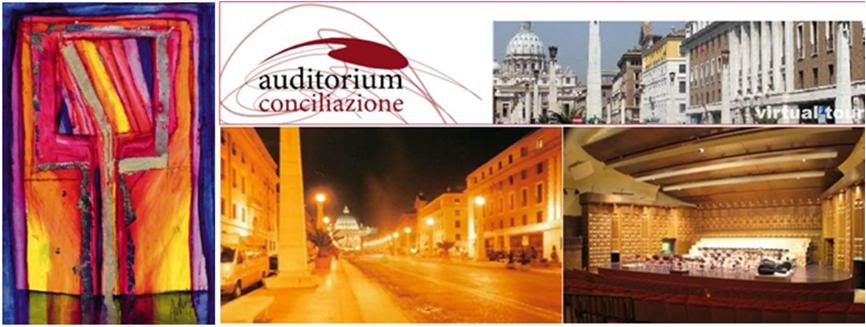 Left photo, program cover: 'Never again war!', Arthur Elser.
Left photo, program cover: 'Never again war!', Arthur Elser.
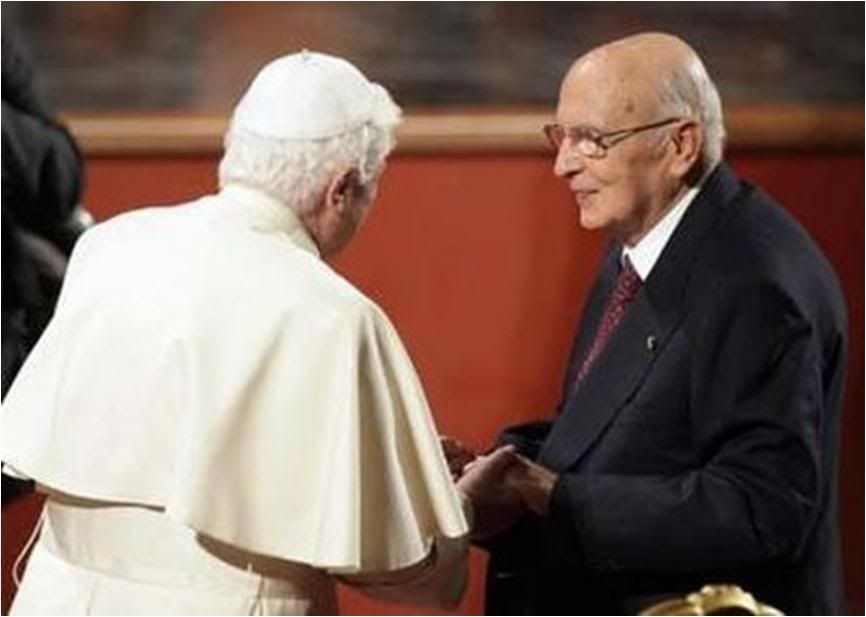
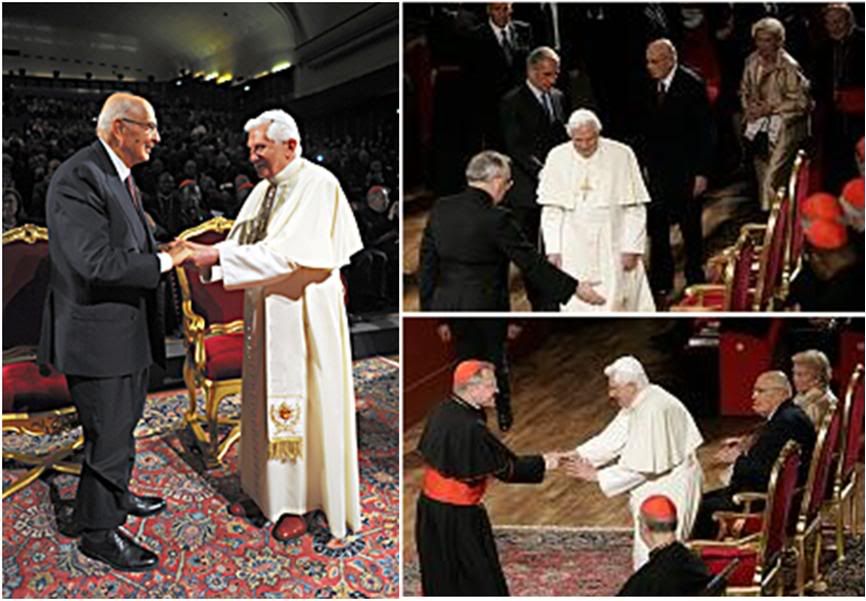
Pope Benedict XVI and Italian President Giorgio Napolitano were the guests of honor tonight, along with the participants of the current Synodal Assembly for Africa, at a concert to mark the 70th anniversary of the start of World War II.
An initiative of the Youth against War movement, the concert at the Auditorium on Via della Conciliazione was performed by the Inter-Regionales Jugendssymphonie Orchester (IRO) as part of the project "1939-2009: 70 years since the start of the Second World War".
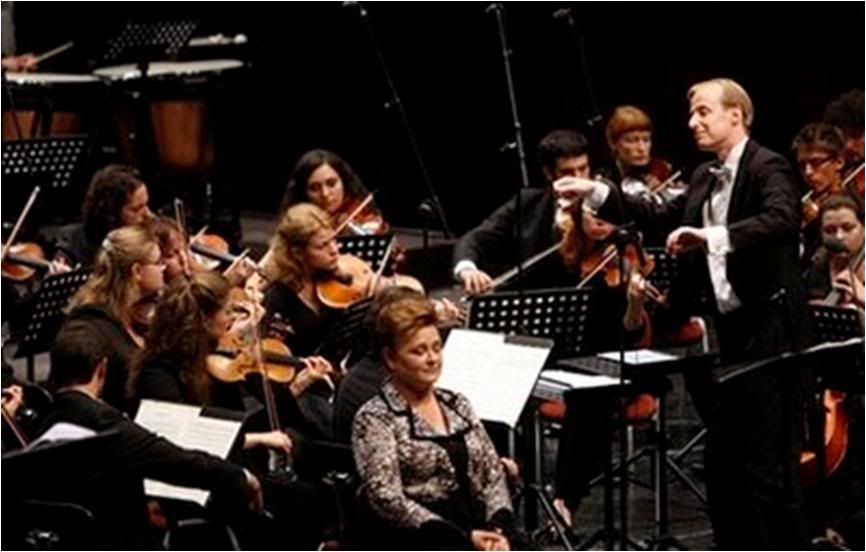
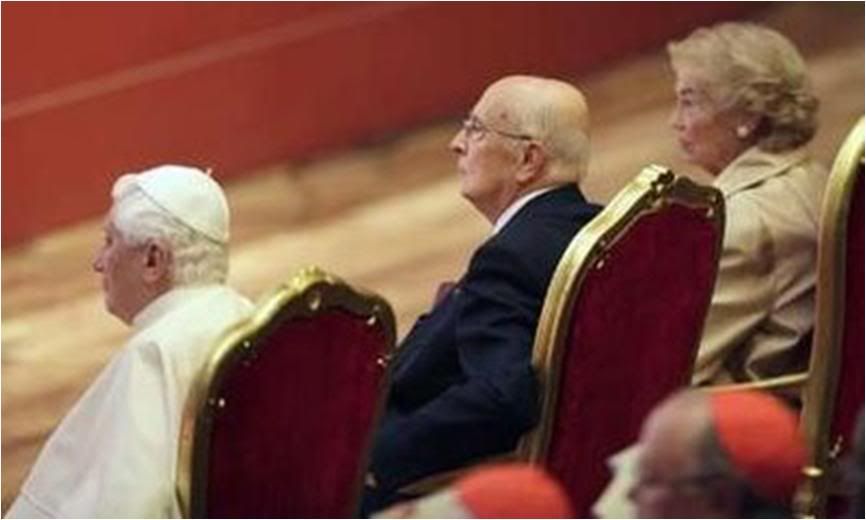
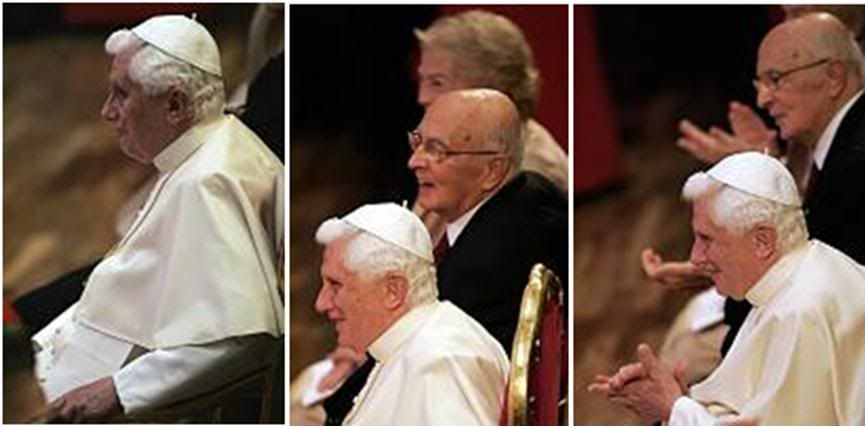
The musical program featured compositions by Gustav Mahler and Felix Mendlssohn Bartholdy. Two Lieder, Urlicht and Irdisches leben, sung by South African mexxo-soprano Michelle Breedt, from Mahler's Des Knaben Wunderhorn [The boy's magic horn) cycle, followed the fourth movement of the composer's Symphony No. 5. Mendelssohn's Fourth Symphony (Italian) concluded the concert.
Both composers were Jewish by birth and experienced strong anti-Semitism all their life. Both were later baptized - Mendelssohn as a Protestant, Mahler as a Catholic. Under the Nazi regime, their music was forbidden.
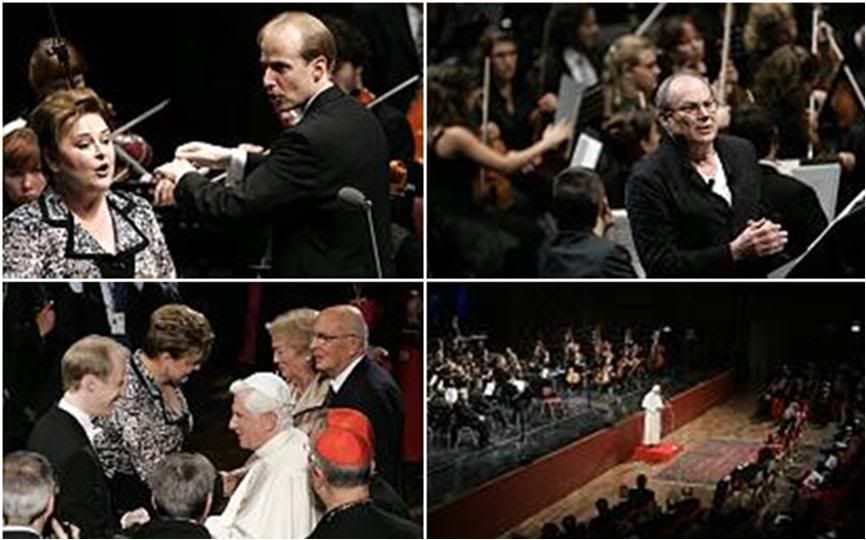
The program also featured readings by German actor Klaus Maria Brandauer Breedt reciting some pieces from German literature: texts by Johann Wolfgang von Goethe, Heinrich Heine, Berthold Brecht, and Paul Celan, as well as two poems written by children who were interned in the concentration camp of Theresienstadt.
Concert sponsors were the Pontifical Council for Promoting Christian Unity and the Vatican Commission for Religious Relationships with Judaism, the German embassy to the Holy See, and the KulturForum Europeo of Mainau (Germany).
Additionally, the International Jewish Committee for Inter-religious Consultations agreed to be a patron, with its member organizations - American Jewish Committee, American Jewish Congress, Anti-Defamation League, B’nai B’rith International, Central Conference of American Rabbis, Israel Jewish Council on Inter-Religious Relations, Rabbinical Assembly, Rabbinical Council of America, Union of Orthodox Jewish Congregations, Union for Reform Judaism, United Synagogue of Conservative Judaism, World Jewish Congress.
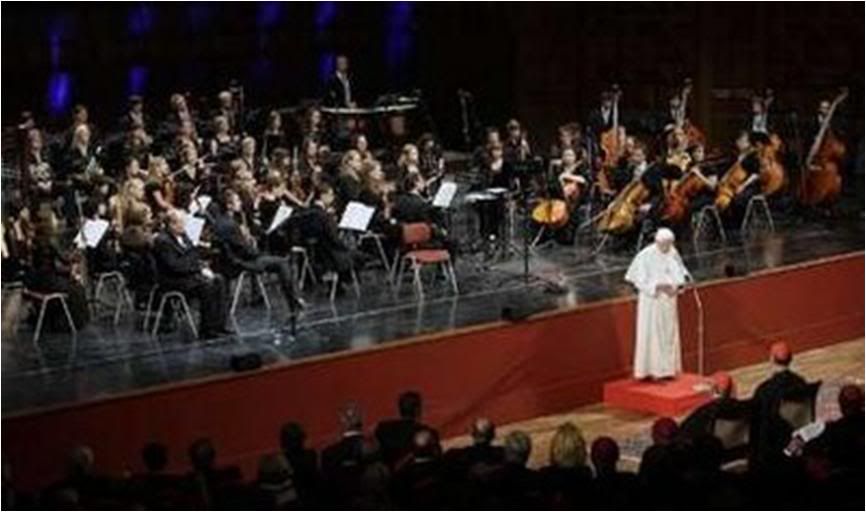 Pope hails fall of Berlin Wall
Pope hails fall of Berlin Wall

ROME, Oct. 8 (AFP) - Pope Benedict XVI said the fall of the Berlin Wall 20 years ago shows that freedom cannot be "repressed and stifled" as he attended a youth anti-war concert in Rome on Thursday.
"The fall of the Wall has shown that the fundamental freedoms that give meaning to human life cannot be repressed and stifled," the 82-year-old German pontiff said.
"The fall of the Berlin Wall is a powerful symbol of the end of totalitarian communist regimes of Eastern Europe," he said.
On November 9, Germany marks 20 years since the fall of the Berlin Wall and the country's reunification.
Chancellor Angela Merkel has invited all European Union leaders to attend the ceremonies to mark the anniversary.
British Prime Minister Gordon Brown, Russian President Dmitry Medvedev and French President Nicolas Sarkozy are among those expected in Berlin for the festivities, set to climax in a "freedom party" at Berlin's Brandenburg Gate.
One world leader not likely to attend is US President Barack Obama, who will be in Asia for a summit. The United States will likely be represented by former president Bill Clinton.
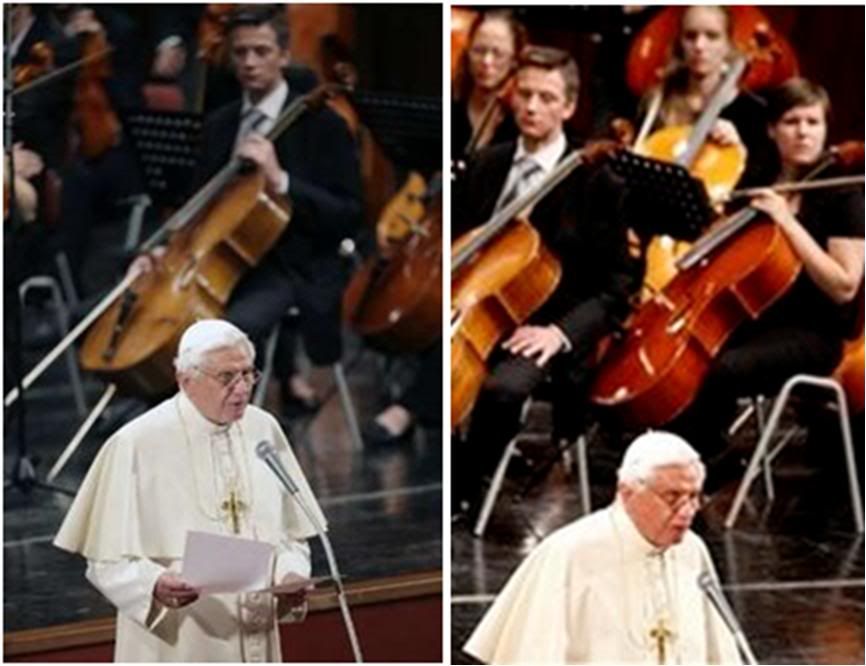 Here is a translation of the Holy Father's remarks, delivered in Italian and German:
Here is a translation of the Holy Father's remarks, delivered in Italian and German:
REMARKS OF BENEDICT XVI
AFTER THE CONCERT
Mr. President of the Italian Republic,
Cardinals and Venerated Synodal Fathers,
Ambassadors, Ladies and gentlemen:
I accepted with pleasure the invitation to attend this "Youth against War concert - 70 years after the start of World War II", jointly promoted by the Pontifical Council for Promoting Christian Unity and the Vatican Commission for Religious Relationships with Judaism, the German embassy to the Holy See, and the KulturForum Europeo of Mainau (Germany), with the patronage of the International Jewish Committee for Inter-Religious Consultations.
I extend my greeting and gratitude to all the promoters and organizers. In particular, I thank Cardinal Walter Kasper for his kind words in their behalf.
I extend a deferential greeting to the President of the Italian REpublic and his kind spouse, and thank them for their presence.
Utilizing the universal language of music, this initiative encourages young people to construct together the future of the world, inspired by the values of peace and brotherhood among all men.
I greet the cardinals, the Synodal fathers, the distinguished members of the diplomatic corps to the Holy See, the sponsors, and everyone present.
In German, he said:
I sincerely thank the young musicians from 15 (German) states who have established together the Inter-Regionalen Jugend-Sinfonieorchester, and their conductor Jochem Hochstenbach, for this outstanding performance.
Ny thanks go likewise to soloist Michelle Breedt for her expressive singing and to Professor Klaus Maria Brandauer for his vivid interpretation of literary texts.
And I thank all who made this evening possible: the International Jewish Committee for Inter-Religious Consultations (IJCIC) as the Patron of this concert, along with the Pontifical Council for Promoting Christian Unity, the German embassy to the Holy See, and the KulturForum Europeo of Mainau (Germany) as promoters.
He resumed in Italian:
Dear friends, This evening brings back to our memory the tragedy of the Second World War, a sad page in history for its violence and inhumanity which caused the deaths of millions, leaving the victors divided, with a Europe to reconstruct.
The war initiated by National Socialism struck down so many innocent populations of Europe and other continents, and with the tragedy of the Shoah, wounded most of all the Jewish people, object of programmed extermination.
And yet, appeals for reasonableness and for peace did not fail to be raised from many sides.
Here from Rome came the heartfelt appeal of my venerated predecessor Pius XII. In his radiomessage on August 24, 1939 - precisely with the imminence of the war that was about to begin - he proclaimed decisively: "Nothing is lost with peace. Everything can be lost with war" (cfr AAS, XXXI, 1939, p. 334).
Unfortunately, no one could stop that vast catastrophe: the logic of selfishness and violence prevailed inexorably. Recalling those events should be a warning, especially for the new generations, nver to fall again into the tempation of war.
As Cardinal Kasper recalled, this year we also commemorate a second significant anniversary: twenty years since the fall of the Berlin Wall, eloquent symbol of the end of the totalitarian Communist regimes in eastern Europe.
"The fall of the Wall," John Paul II wrote, "like the collapse of dangerous models and an oppressive ideology, have demonstrated that fundamental freedoms, which give significance to human life, cannot be repressed and suffocated for long" (cfr Insegnamenti, XIII,1, 1990, p. 1389).
Europe and the entire world have a thirst for freedom and peace! We must build together a true civilization, not based on force, but as "the fruit of victory over ourselves, over the powers of injustice, selfishness and hatred, which can end up disfiguring man (cfr ibid., XII,2,1989, p. 379).
As Cardinal Kasper pointed out, the ecumenical movement, which found a catalyst in the second world war, can contribuite to building such a civilization together with the Jews and all believers.
May God bless us and grant mankind the gift of his peace. Dear friends, thank you once again for your presence.
[Modificato da TERESA BENEDETTA 10/10/2009 00:26] |
| |
 09/10/2009 12:38 09/10/2009 12:38 |
|
| | | OFFLINE | | Post: 18.594
Post: 1.247 | Registrato il: 28/08/2005
Registrato il: 20/01/2009 | Administratore | Utente Veteran | |
|
 Friday, Oct. 9
Friday, Oct. 9
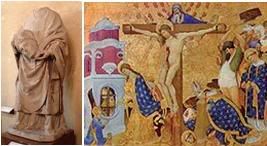 ST. DENIS & COMPANIONS (d. 258)
ST. DENIS & COMPANIONS (d. 258)
Martyrs under Emperor Valerian
St. Denis, an Italian, was the first Bishop of Paris.
He is depicted carrying his head in his hands.
OR today.
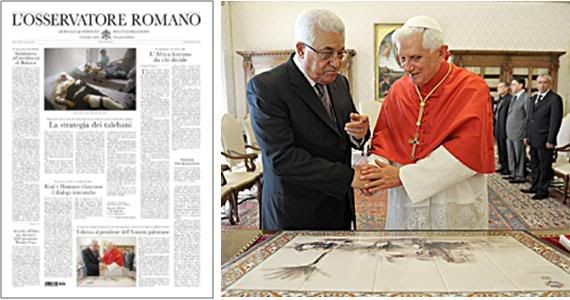
The only papal story in today 's issue is the Holy Father's meeting with Palestinian President Mahmoud Abbas.
Other Page 1 stories: An editorial about how Africa is under-represented in world forums like the G20 that
decide global economic and financial policy; a Congolese archbishop leaves the current Synodal assembly
because of worsening conflict in Bukavu, with parishes burned and local people taken hostage for ransom;
the Taliban in Afghanistan attack the Indian embassy in Kabul; the UN Security Council agrees to discuss
the Goldstone report accusing both Hamas and Israeli of war crimes during the Gaza conflict in late 2008;
Riyadh and Damascus re-start inter-Arab dialog.
 Above photos illustrate three inside-page stories: president Napolitano and Cardinal Bertone open a Rome exhibit on the "the Power and the Glory: the Patron Saints of Europe"; Ecumenical Patriarch Bartholomew I addresses the World Council of Churches' commission on faith and constitutions, saying Christian unity requires an attitude of indulgence rather than impatience; and Sisters of the Visitation take over the Vatican's resident monastery of nuns in the service of the Pope, after 5 years of the Benedictines.
THE POPE'S DAY
Above photos illustrate three inside-page stories: president Napolitano and Cardinal Bertone open a Rome exhibit on the "the Power and the Glory: the Patron Saints of Europe"; Ecumenical Patriarch Bartholomew I addresses the World Council of Churches' commission on faith and constitutions, saying Christian unity requires an attitude of indulgence rather than impatience; and Sisters of the Visitation take over the Vatican's resident monastery of nuns in the service of the Pope, after 5 years of the Benedictines.
THE POPE'S DAY
No scheduled events for the Holy Father today, but the Friday morning bulletin from the Synodal assembly says
he attended the session. He did not attend the afternoon session.
The Vatican released the text of the Holy See representative's intervention on religious freedom
to a meeting of the UN's European Office for Democratic Institutions and Human Rights that met in Warsaw
on Sept. 28-Oct. 8 [Excellent statement on religious freedom, posted in full in the CHURCH&VATICAN thread].
[Modificato da TERESA BENEDETTA 09/10/2009 21:59] |
| |
 09/10/2009 23:38 09/10/2009 23:38 |
|
| | | OFFLINE | | Post: 351
Post: 4 | Registrato il: 17/05/2006
Registrato il: 02/05/2009 | Utente Comunità | Utente Junior | |
|
Thanks for the post and the photo's Teresa. Quite a lovely surprise seeing Michelle Breedt sitting on stage and reading that the Pope thought her singing expressive.
She is not a German singer but a South African mezzo soprano who actually sat in my classes as a student and has become a friend. She is Professor Extraordinaire in Singing at the University where I taught, so I'll hopefully be seeing her "soon" and it will be interesting to hear her view of this concert and our hero, Benedict XVI.
Her career is flourishing. She lives in Innsbruck (a few weeks per year....) and has just finished another Bayreuth Festival, and preparing for Vienna State Opera (with Gruberova, I see) in November.
Her website says that she sang in Carnegie Hall (Beethoven 9th) in March under Maris Janssons. Perhaps you yourself attended that performance? (Beethoven 9 is not my favourite though....) Anyhow, when she's in New York again, please go and listen. If you like her singing (she's dynamite!) let me know, please. ![[SM=j7798]](https://im0.freeforumzone.it/up/0/98/2971038.jpg)
 My goodness! How exciting for you!!! Sometimes, it really is a small world. Thanks for pointing out Ms. Breedt's nationality - I will correct the entry above - and all the additional information. I was going by the single news release that everyone has been recycling since the concert was first announced in September.... And please share with us eventually what her experience was like with B16....
My goodness! How exciting for you!!! Sometimes, it really is a small world. Thanks for pointing out Ms. Breedt's nationality - I will correct the entry above - and all the additional information. I was going by the single news release that everyone has been recycling since the concert was first announced in September.... And please share with us eventually what her experience was like with B16....
TERESA
[Modificato da TERESA BENEDETTA 10/10/2009 14:06] |
| |
 10/10/2009 02:12 10/10/2009 02:12 |
|
| | | OFFLINE | | Post: 18.603
Post: 1.256 | Registrato il: 28/08/2005
Registrato il: 20/01/2009 | Administratore | Utente Veteran | |
|

 Italian bioethicists write book
Italian bioethicists write book
to say the Pope is right
about condoms and AIDS

ROME, OCT. 9, 2009 (Zenit.org).- Benedict XVI caused a media storm on his way to Africa in March by saying that condoms are not the solution to AIDS. An African cardinal, the relator-general of the synod of bishops on Africa that is under way, brought the same storm a few days ago, reiterating the same point.
In the context of this turmoil, ZENIT spoke with Doctor Renzo Puccetti and Cesare Cavoni, a bioethics professor, who are in the process of publishing their book Il Papa ha ragione! L'Aids non si ferma con il condom (The Pope Is Right: AIDS Is Not Stopped With Condoms).
Puccetti contended that the accounts of Cardinal Peter Turkson's statements can be classified as "the umpteenth case of distortion of the message."
"In the first place, the cardinal did not make a moral evaluation of the issue; at the same time, in his statements, he said nothing against the constant moral teaching of the Church," the doctor affirmed.
He added, "When the president of Uganda gave a green light to the ABC -- Abstinence, Be Faithful, Condom -- strategy, which was very effective in combating the AIDS epidemic and was later taken as a model with the same success in other African countries, he said rather similar things to what the cardinal said: Life cannot be put at stake entrusting it to a fine coat of latex."
Puccetti acknowledged that it is not easy to give a categorical answer to the question of whether the condom serves to stop AIDS.
"It isn't easy to answer categorically," he said, "but if I must say that the condom serves to halt AIDS in generalized epidemics, the answer I can give according to the body of available scientific knowledge is 'no.'"
For the condom to work, the doctor continued, "man would have to be not much different than a rat in a cage in which, before each copulation, someone dons the condom. In that case, the condom might be useful."
"But as man is not a rat, does not live in cages and there are no professionals ready to burden him with the condom, one must not be surprised then that the theoretical efficacy does not occur on the spot in real life," Puccetti added.
The authors explained their book stems from a "sad verification" that the media often "deforms" the facts.
"The book stems from this sadness and, also, from the anger of seeing fundamental principles of correct information trampled," Cavoni said. "At the same time we felt it an imperative to give the public the facts as they occurred and, in some way, open the eyes of public opinion, so that it does not take as fine gold clumsy instrumentalizations, perpetrated by ideological motives, superficiality, or both factors."
"The reading of the book makes extremely evident the progressive distortion of the message, including additions, omissions, substitutions," Puccetti added. "[...] In the second part of the book, we summarized as best we could the gamut of knowledge offered by the international scientific literature in regard to the clinical application of prevention through promoting the use of the condom.
"We have paid special attention to the numbers, because we believe they can be the basis for a shared discussion outside the religious orientation."
Cavoni contended that the media uproar in March can be attributed to false information.
"All the major national and international newspapers launched themselves, directly or indirectly, against the Pontiff, guilty of having said that condoms do not resolve the problems in Africa but rather aggravate them," Cavoni recalled.
"The criticisms were escalated the moment the most ferocious observations arrived on the part of several European government exponents, including the resolution of the Belgian Parliament that requested that the Pope deny what he had affirmed.
"The fact is that one presumes that whoever takes such strong positions, knows what the Pope really said, but it wasn't like this. All were talking but few had listened. So much so that, subsequently, many scientists confirmed the concepts Benedict XVI expressed."
The author lamented that it still holds true: People believe what they hear on TV or read in the newspaper.
"The media acquires a very powerful principle of authority," he said. "If, therefore, things, events, the news presented are based on partial reconstructions or bits of reality, the reader will receive the gift of a deformed reality, which does not correspond to the truth. With this technique one can even create a virtual reality parallel to the real one. [...]
"We are not speaking of a nebulous objectivity, of impartiality. No, we are talking about the fact that I must be present on the scene of the event about which I write. And if this isn't possible, given that in the specific case, not all journalists can be in the Pontiff's entourage, at least I must take the trouble to listen again, word for word, to what the Pope really said and why he said it.
"Instead, many trusted what they heard being said about an initial, incorrect text. The rest is the typical story of misinformation."
[Modificato da TERESA BENEDETTA 10/10/2009 02:13] |
| |
 10/10/2009 14:24 10/10/2009 14:24 |
|
| | | OFFLINE | | Post: 18.608
Post: 1.258 | Registrato il: 28/08/2005
Registrato il: 20/01/2009 | Administratore | Utente Veteran | |
|
 Saturday, Oct. 10
Saturday, Oct. 10
 ST. FRANCISCO DE BORJA (Spain, 1510-1572)
ST. FRANCISCO DE BORJA (Spain, 1510-1572)
Jesuit, Reformer and Confessor
OR today.
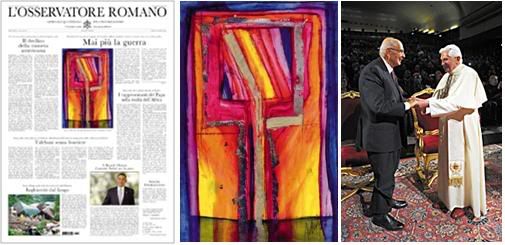 Illustration: Painting by Arthur Elser.
Illustration: Painting by Arthur Elser.
Benedict XVI recalls WWII tragedy and calls for a true civilization of peace:
'Never again war!'
Other Page 1 stories: At the Synodal assembly, Cardinal Bertone explains the role of Apostolic
Nuncios in Africa; a look at the continuing decline of the American dollar because of US fiscal
policies; Taliban step up attacks in Pakistan; Obama's Nobel Peace Prize; and mudslides in
northern Philippines after worst flooding in 4o years.
THE POPE'S DAY
The Holy Father met today with
- King Albert II and Queen Paola of Belgium, with delegation
- Prime Minister Francois Fillon of France, with his wife and delegation
[Modificato da TERESA BENEDETTA 10/10/2009 14:25] |
| |
 11/10/2009 01:32 11/10/2009 01:32 |
|
| | | OFFLINE | | Post: 18.610
Post: 1.259 | Registrato il: 28/08/2005
Registrato il: 20/01/2009 | Administratore | Utente Veteran | |
|
 Pope Benedict XVI receives
Pope Benedict XVI receives
the Catholic monarchs of Belgium
Translated from

Oct. 10, 2009
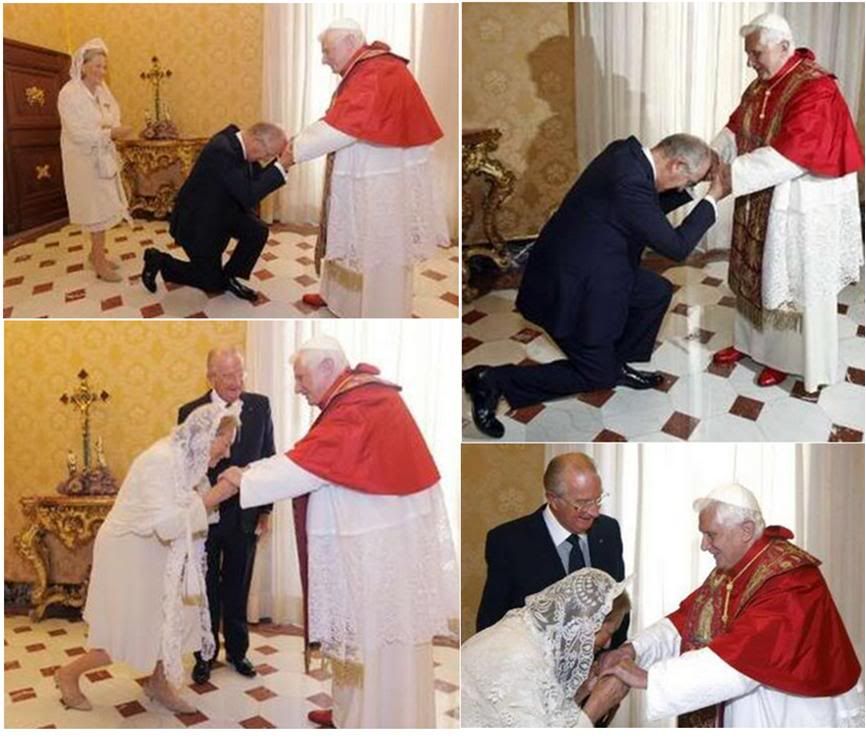
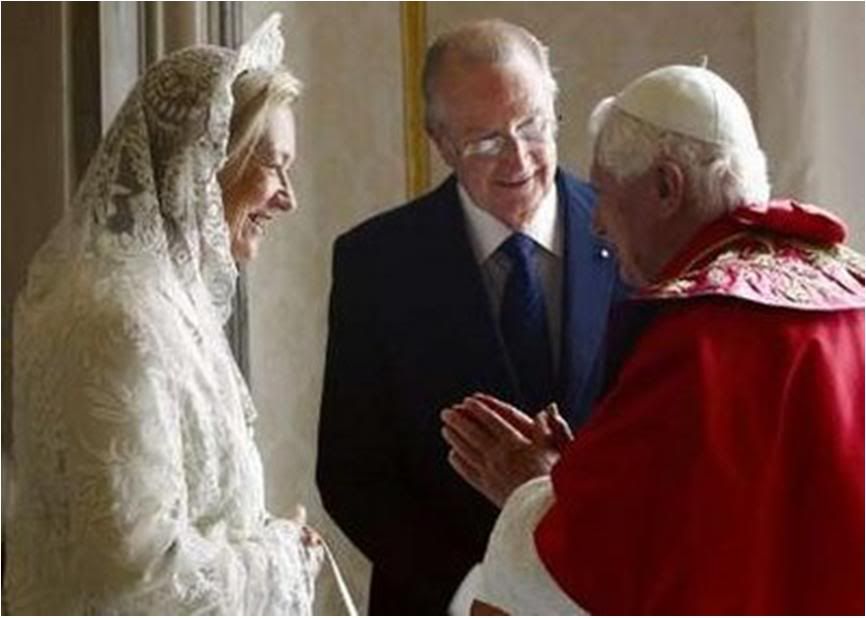
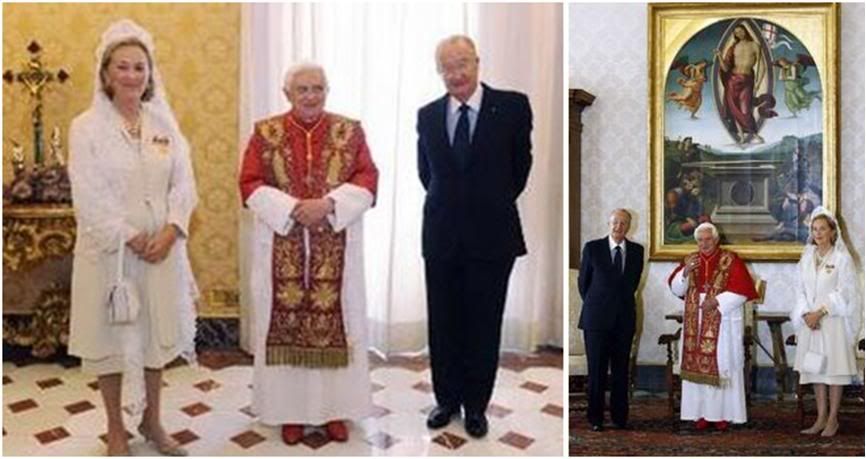
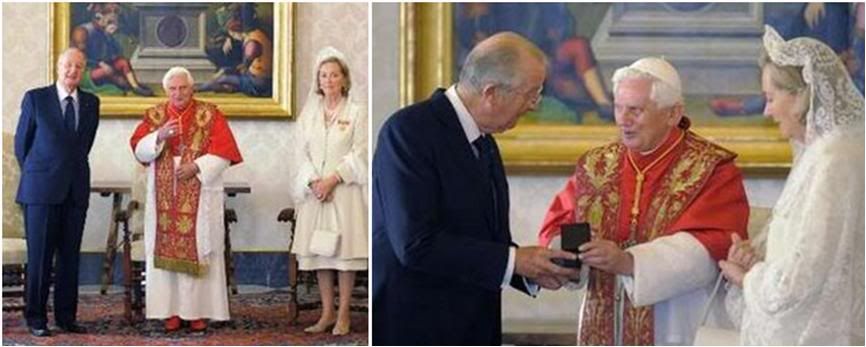
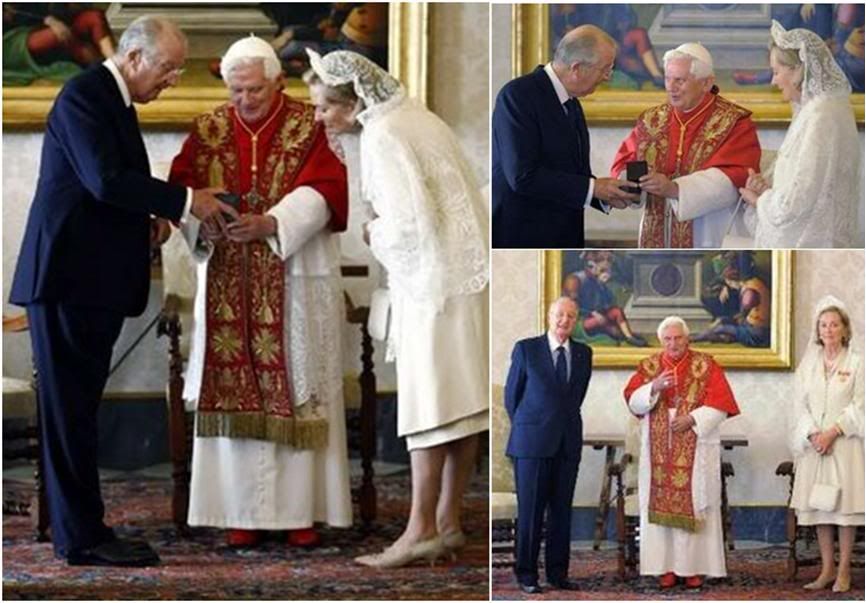
This morning, the Holy Father Benedict XVI received in audience the King of the Belgians, His Majesty Albert II, with Her Majesty Queen Paoloa.
After the Pontifical audience, His Majesty had a meeting with Cardinal Secretary of State Tarcisio Bertone and Mons. Dominique Mamberti, secretary for relations with states.
They discussed issues concerning Africa and international politics, respect for human rights and the development of peoples.
Recalling the history of the Church in Belgium, they dwelt on the importance of the canonization tomorrow of Blessed Josef Daamien de Veuster, a Belgian of Flemish ancestry, and his exmaple for Belgium and for the whole world.
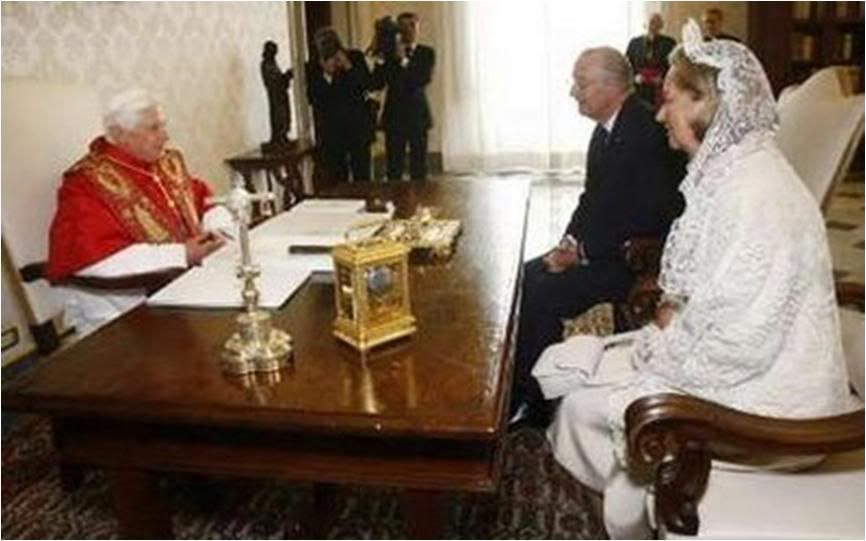
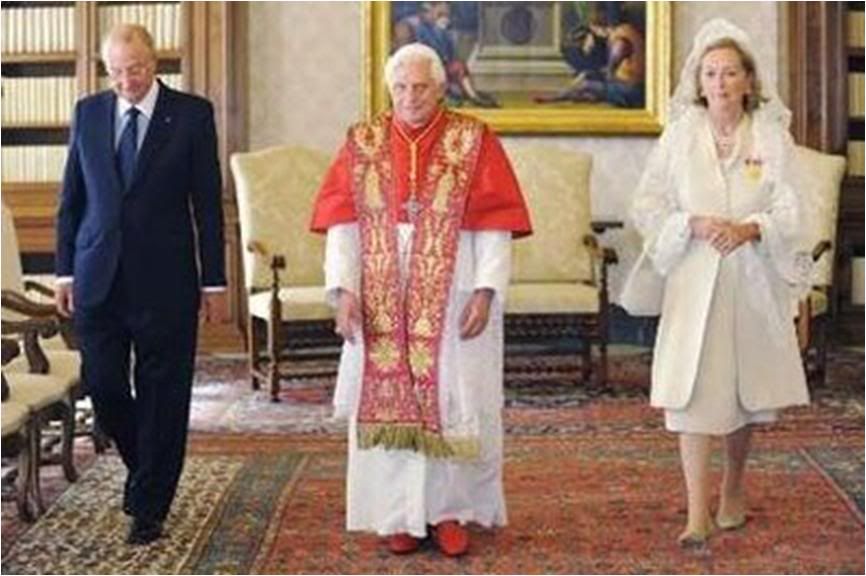
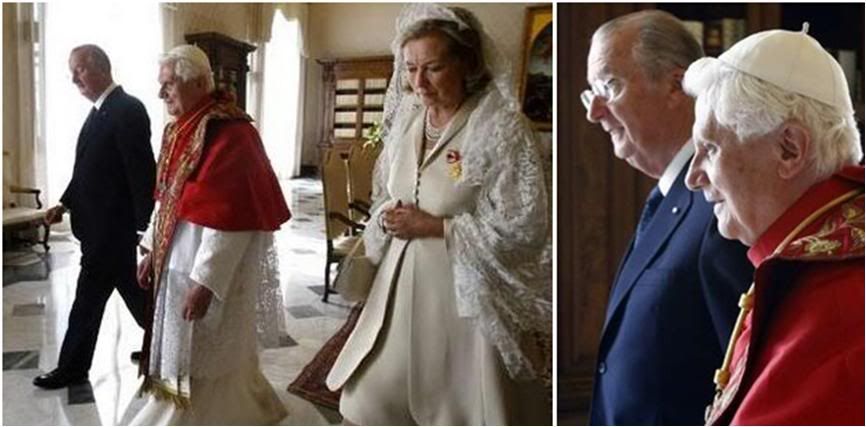
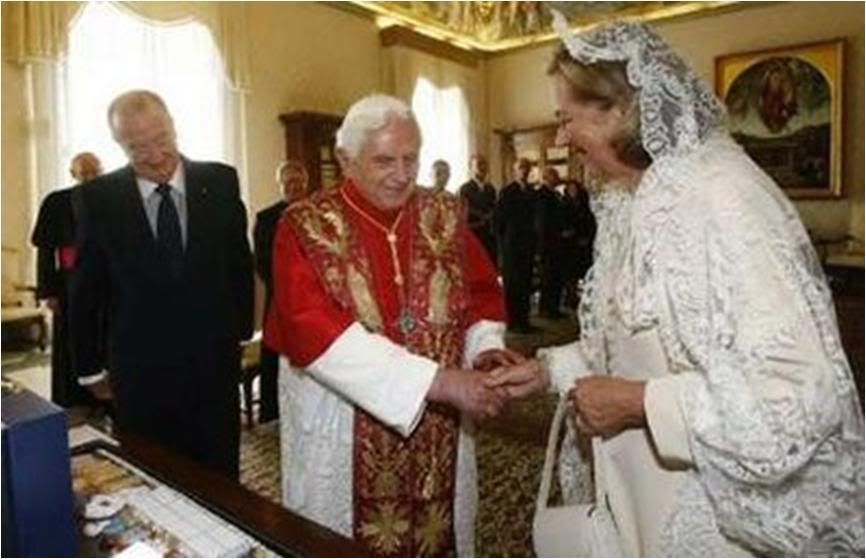
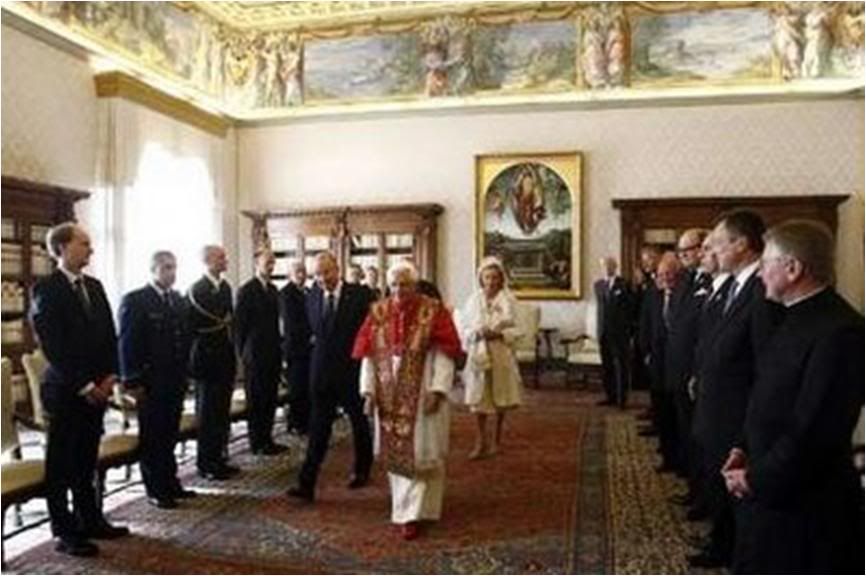
The Belgian King and Queen, and the King and Queen of Spain, are the only remaining Catholic monarchs in the world, along with the Grand Duke and Duchess of Luxembourg.
By traditional protocol, Catholic queens are dressed in white, with a white mantilla, when they visit the Pope.
King Albert and Queen Paola are in Rome for the canonization of Blessed Damien tomorrow.
Also a Vatican guest today:
The French Prime Minister
Translated from

Oct. 10, 2009
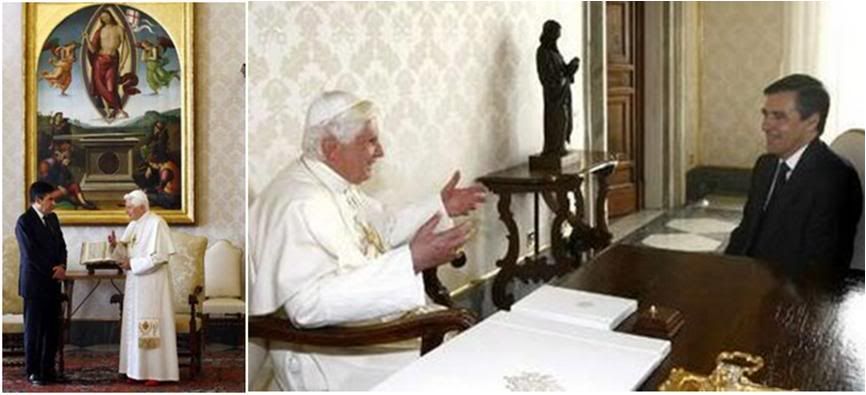
This morning, Saturday, the Holy Father also had a private audience with the Prime Minister of France, H.E. François Fillon.
Afterwards, the Prime Minister met with Cardinal Secretary of State Tarcisio Bertone and Mons. Dominique Mamberti, secretary for relations with states.
During the conversations, the Pope recalled his trip to Paris and Lourdes last year [at which time, it was Premier Fillon who saw him off from Lourdes with a speech that was far from perfunctory].
They spoke of the importance of the canonization tomorrow of the Blessed Jeanne Jugan, the reason for Mr. Fillon's presence in Rome.
They reviewed bilateral relations and the necessity of carrying on dialog and collaboration between the Holy See and the French Republic.
They also exchanged views on the international situation, particularly the Middle East and some African countries that were former French Colonies, in connection with the curretn special Synodal assemblt for Africa, as well as inter-religious dialog; and climate change.
They discussed the positive influence of the encylical Caritas in veritate with respect to the global economic crisis and to the new international regulations that must be put in place for a more efficient and ethical economic system, particularly in relation to the poorer countries.
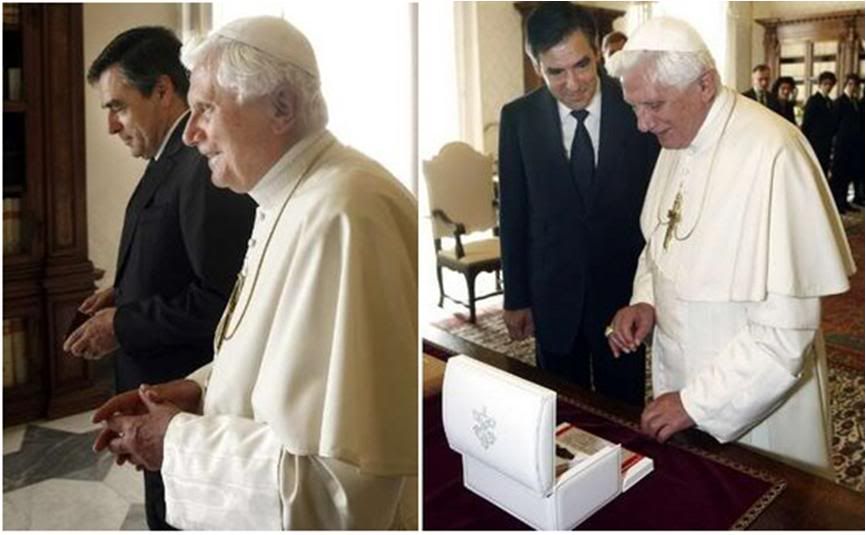
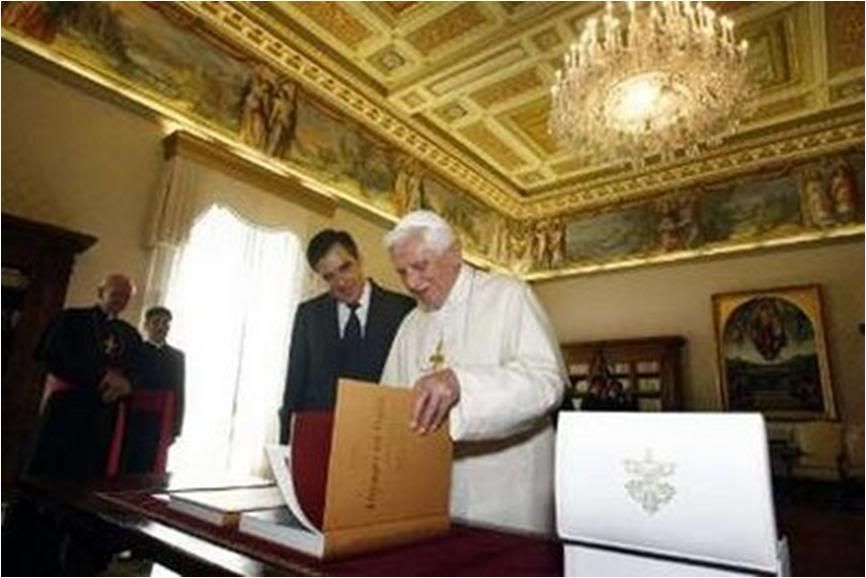
[Modificato da TERESA BENEDETTA 11/10/2009 01:54] |
| |
|
|
|
|